3. szám | 2024. tavasz | Magyar kiadás
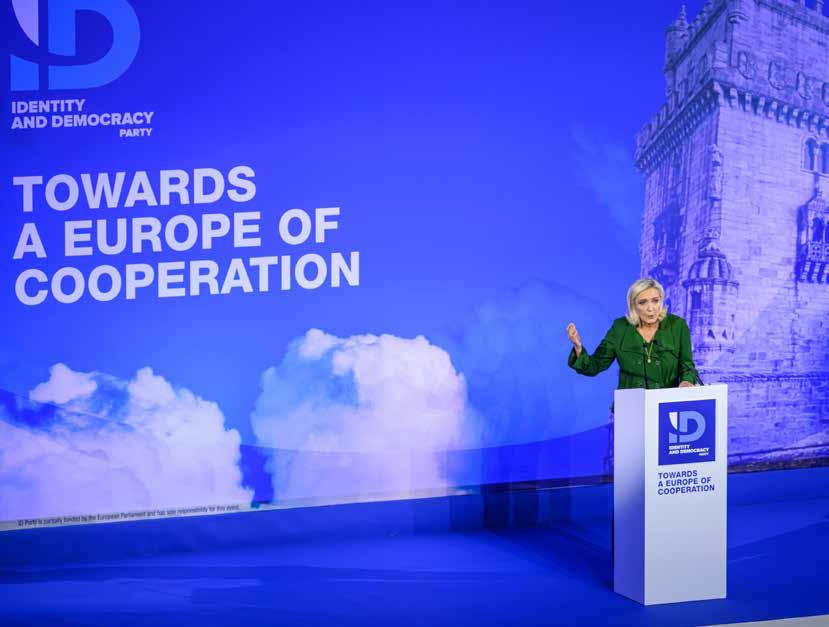
Az együttműködés Európája felé!
Working towards a Europe based on cooperation
VEZETŐINK LEÍRJÁK
EURÓPÁRÓL ALKOTOTT
VISSZATEKINTÉS
Az Eidos az Identitás és Demokrácia Párt magazinja.

3. szám | 2024. tavasz | Magyar kiadás

Az együttműködés Európája felé!
Working towards a Europe based on cooperation
VEZETŐINK LEÍRJÁK
EURÓPÁRÓL ALKOTOTT
VISSZATEKINTÉS
Az Eidos az Identitás és Demokrácia Párt magazinja.
History is on our side
Throughout Europe, people have taken to the streets in recent years.
People took to the streets in yellow vests against rising taxes and a rising cost of living.
People took to the streets when their freedom was taken away during the Covid period.
People took to the streets in tractors, because farming and providing people with food is made virtually impossible.
Health workers took to the streets, police unions took to the streets, pensioners took to the streets.
Meanwhile, the EU elite continues. Plans regarding a Green Deal, EU taxes, a common health policy or a migration pact are further rolled out with the steam-roller.
The EU elite believes that the protest is ‘on the wrong side of history’. The people are not heard.
However, we, parties that want a different and better Europe, do hear these people and, above all, we listen to them. We stood with them on the streets and also speak on their behalf in parliaments.
This steam-roller must be stopped and the tanker turned. We firmly
A történelem a mi oldalunkon áll
Az elmúlt években Európa-szerte utcára vonultak az emberek.
Az emberek sárga mellényben vonultak az utcára a megemelt adók és a növekvő megélhetési költségek ellen.
Az emberek az utcára vonultak, amikor a Covid időszakban megfosztották őket a szabadságuktól.
Az emberek traktorokkal vonultak az utcára, mert gyakorlatilag lehetetlenné vált a paraszti gazdaság működtetése és a lakosság élelmezése.
Az egészségügyi ágazatban dolgozó alkalmazottak az utcára vonultak; a rendőrszakszervezetek az utcára vonultak, a nyugdíjasok az utcára vonultak.
Eközben Európa elitje makacsul tartja magát. A Green Dealre, az európai adókra, a közös egészségügyi politikára és a migrációs paktumra vonatkozó projekteket ezután gőzerővel, úthengerként előre törve valósítják meg.
Az európai elit úgy véli, hogy a tiltakozás „a történelem rossz oldalán áll”. A népet nem hallgatják meg.
Mi azonban, a más és jobb Európát akaró pártok, meghallgatjuk ezeket az embereket, és főként halljuk az üzenetüket. Vállvetve kiállunk mellettük
believe in our common project and will persevere, despite obstruction, despite lying media reports, despite transparent attempts to pit us against each other.
I consider myself fortunate that the partners of our European party Identity & Democracy have persevered together and are today in a better position than ever before. We have welcomed new members. It looks like our political family will grow even more, not only because our parties will emerge as great victors, but also because we will welcome new partners from new Member States.
We will make history in June, because history is on our side!
Gerolf Annemans
Chairman Identity and Democracy Party
az utcán, és a parlamentek előtt is felszólalunk a nevükben. Meg kell állítanunk ezt az úthengert, és újra be kell indítanunk a tankereket. Szilárdan hiszünk közös projektünkben, és kitartunk az akadályok, a média félrevezető tájékoztatásai és annak ellenére, hogy átlátszó módon megpróbálnak minket egymás ellen fordítani.
Szerencsésnek tartom magam, hogy az Európai Identitás és Demokrácia Pártjának partnerei kitartottak egymás mellett, és most jobb helyzetben vannak, mint valaha. Számos új tagot köszöntöttünk. Úgy tűnik, hogy politikai családunk még nagyobb lesz, nemcsak azért, mert pártjaink lesznek a nagy nyertesek, hanem azért is, mert új partnereket fogadunk be új tagállamokból.
Júniusban történelmet írunk, mert a történelem a mi oldalunkon áll!
Gerolf Annemans az Identitás és Demokrácia Párt elnöke


42 1. DOSSZIÉ - Intézmények
8 Június 6. és 9. között két Európa-vízió ütközik meg
From June 6 to 9, two opposing visions of Europe will
Report 1 - Institutions :
Looking back at the relentless five-year headlong rush of the Europeanists
50 2. DOSSZIÉ - Bevándorlás
Report 2 - Immigration : From Lampedusa to our villages, the consequences of immigration gone mad
58 3. DOSSZIÉ - Green Deal : a zöld felváltotta a pirosat
Report 3 - Green Deal : green has superseded red
ESEMÉNYEK / EVENTS
66 Az ID párt kongresszusa: az


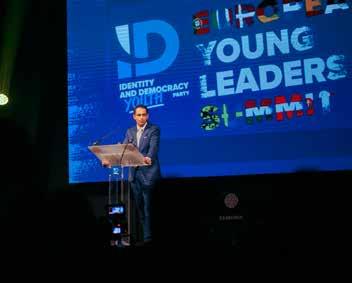
együttműködés Európája felé
Fiatalok ID pártja
ID Party Congress: towards a Europe of cooperation
Brüsszeli találkozó Római találkozó
Young people from the ID Party meet in Brussels and Rome

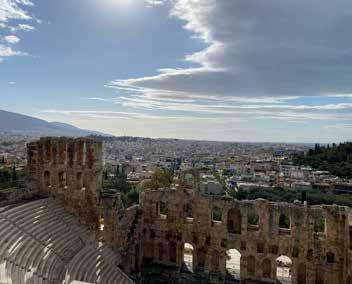
HAZÁK ÉS PÁRTOK / COUNTRIES AND PARTIES
92 A hazafiak átveszik a hatalmat Európa-szerte
Patriots are taking the reins of power across Europe
98 Geert Wilders, a következetesség fontossága
A look back at a term at your service
Geert Wilders, the importance of being determined A NÉZET / FOCUS 102 Európa mint civilizáció
Europe as a civilisation

VÁLASZTÁSOK EUROPEAN ELECTIONS
VÁLASZTÁSOK
ELECTIONS
VÁLASZTÁSOK EUROPEAN ELECTIONS
VÁLASZTÁSOK EUROPEAN ELECTIONS
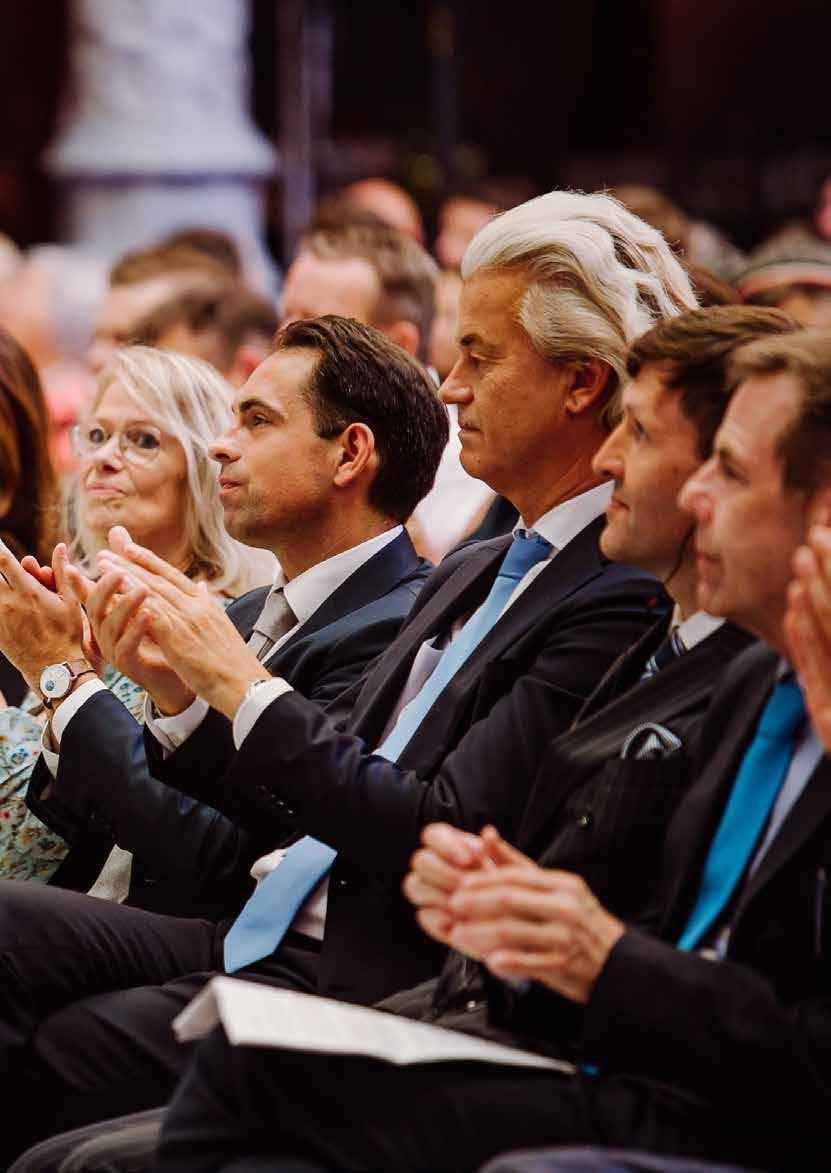
From June 6 to 9, two opposing visions of Europe will clash
From June 6 to 9, the citizens of the 27 Member States of the European Union will be heading to the polls to elect the 720 members who will take their seats in Strasbourg.
This will give rise to two opposing visions of Europe: that of the Europeanists, constantly seeking to ensure greater federalism and ever less sovereignty for the Nation States on the one hand; and that of cooperation between free and sovereign nations on the other.
The Europeanist vision is embodied by the current European leaders, first and foremost Commission President Ursula von der Leyen and European Council President Charles Michel. It is worth remembering their trip to Ankara in 2021, when the latter refused to give up the only free seat to the former: we do not intend to discuss the Belgian liberal’s boorish attitude here, but rather the lack of clarity that prevails at the summit of the European Union, as illustrated by the event in question
Az Európai Unió 27 tagállamának polgárai június 6. és 9. között az urnákhoz járulnak, hogy megválasszák azt a 720 képviselőt, akik Strasbourgban foglalják el helyüket.
Két Európa-vízió ütközik meg egymással: az egyik oldalon az európaiság híveinek víziója, akik egyre több föderalizmust és egyre kevesebb szuverenitást akarnak a nemzetállamoknak; a másik oldalon pedig a szabad és szuverén nemzetek közötti együttműködés híveié.
Az európaiság vízióját Európa jelenlegi vezetői testesítik meg, köztük elsősorban Ursula von der Leyen, az Európai Bizottság elnöke és Charles Michel, az Európai Tanács elnöke. Emlékezzünk a két partner 2021-es ankarai látogatására, amikor az utóbbi nem volt hajlandó átadni az egyetlen szabad helyet az előbbinek: itt most nem a belga liberális otrombaságára térünk vissza, hanem az Európai Unió csúcsán uralkodó tisztánlátás hiányára, amelyet a jelenet szimbolizált.
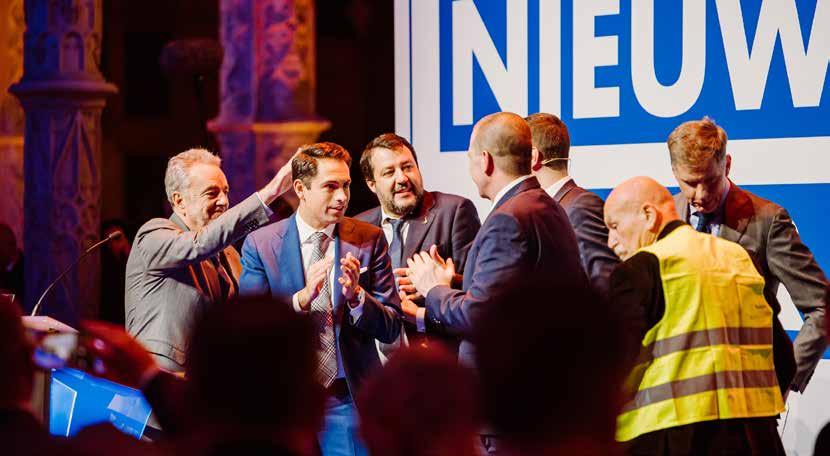
As for the national vision, it is supported by the patriotic parties and their leaders: Jordan Bardella (France), Matteo Salvini (Italy), Tom Van Grieken (Flanders), Herbert Kickl (Austria), André Ventura (Portugal), Tomio Okamura (Svoboda a Prima demokracie - SPD), Martin Helme (Estonia), Geert Wilders (The Netherlands), Andrej Danko (Slovakia), Tino Chrupalla and Alice Weidel (Germany); so many politicians who will embody the Europe of the future. For them, it is important that power is put back into the hands of the people and not those of a few out-of-touch politicians.
Over the past few years, we have witnessed a relentless headlong rush to achieve the federalist project, a subject to which we will return in the following pages. The June elections will be a unique opportunity to reverse this trend. We have every right to be optimistic: all the polls suggest that Identity and Democracy group parties will gain ground.
A nemzeti jövőképet a hazafias pártok és vezetőik hordozzák: Jordan Bardella (Franciaország), Matteo Salvini (Olaszország), Tom Van Grieken (Flandria), Hebert Kickl (Ausztria), André Ventura (Portugália), Tomio Okamura (Csehország), Martin Helme (Észtország), Geert Wilders (Hollandia), Andrej Danko (Szlovákia), Tino Chrupalla és Alice Weidel (Németország) azok a politikus vezetők, akik a jövő Európáját megtestesítik. Ez utóbbiak számára fontos, hogy a hatalom visszakerüljön a nép kezébe, és ne néhány, a valóságtól elrugaszkodott politikuséban legyen.
Az elmúlt években a föderalista projekt egyre inkább előtérbe került, és erre a témára a következő oldalakon még viszszatérünk. A júniusi választások soha vissza nem térő alkalom ennek a tendenciának a megfordítására. Minden jogunk megvan ahhoz, hogy optimisták legyünk: valamennyi felmérés az Identitás és Demokrácia pártcsaládba tartozó pártok számának növekedését mutatja.
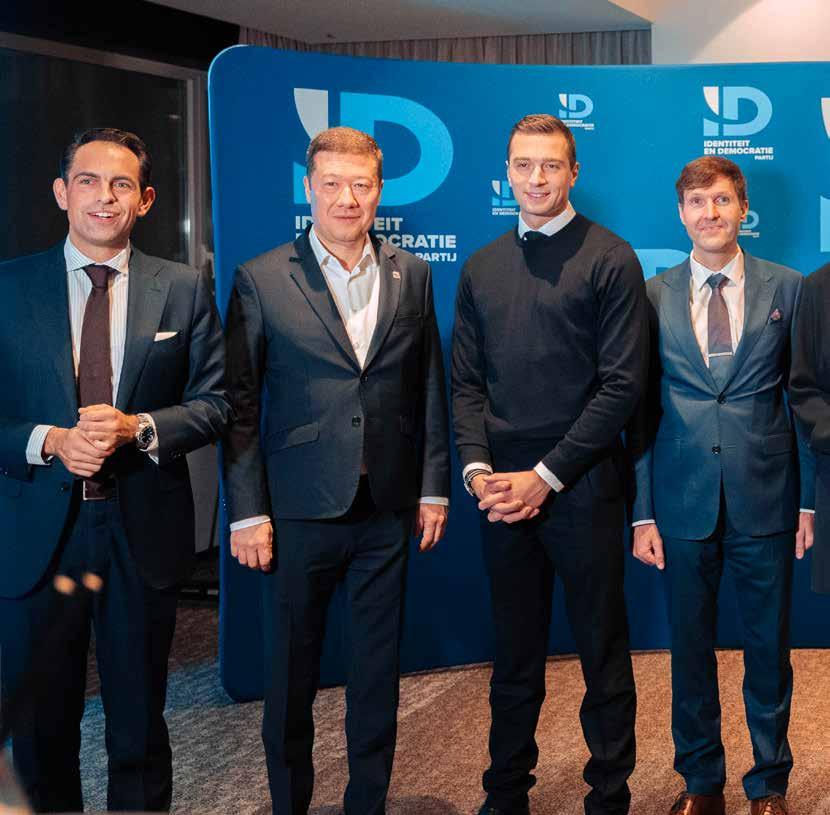
It is important for patriots to form a sufficiently strong group in the European chamber to thwart the plans of the most relentless Europeanists. And, above all, it is vital that we build a different kind of Europe, one based on cooperation between free and sovereign States that are willing to work together of their own free will.
A hazafiak számára fontos, hogy az európai ülésteremben kellően erős csoportot hozzanak létre a legelszántabb föderalisták terveinek meghiúsítására. És mindenekelőtt az, hogy egy másfajta Európát építsünk, amely a szabad és szuverén államok közötti együttműködésen alapul, amelyek szabad akaratukból kívánnak együttműködni.
Az ID párt vezetőinek találkozója Brüsszelben 2023 novemberében
ID Party leaders gathered in Brussels in November 2023

Cooperation implies mutual respect, as in a shared flat, where everyone is free to manage their own space as they see fit, but must agree on the tasks that need to be managed jointly, without anyone being able to impose their vision on the others.
Az együttműködés megköveteli az egymás iránti tiszteletet, mint egy társbérletben, ahol mindenki szabad belátása szerint kezelheti a saját területét, de ahol fontos, hogy megállapodjunk a közösen megoldandó feladatokban, anélkül, hogy bárki is rá tudná erőltetni a saját elképzeléseit a többiekre.
How will the vote be conducted?
Voting will be conducted according to the proportional representation system, simultaneously in each of the Member States, on the basis of lists drawn up in advance within each country. Estonians will vote for Estonians, Czechs for Czechs and the Flemish for the Flemish.
In future elections, the ID Party is the only party that will be fighting to keep it that way. The Europhiles hope to introduce transnational lists, which could require you to vote for people of a nationality other than your own that you probably won’t even know. This is total nonsense!
You will therefore be able to vote for the list of your choice: it will bear the name of the national party you know: Rassemblement National (National Rally) in France, Alternative für Deutschland in Germany, Vlaams Belang in Flanders, Lega in Italy, EKRE in Estonia, Partij voor de Vrijheid in the Netherlands, Freiheitliche Partei Österreichs in Austria, Svoboda a Prima Demokracie in the Czech Republic, Chega in Portugal, Slovenská národná strana in Slovakia, etc.
A szavazásra arányos képviselettel, tagállamok mindegyikében egyidejűleg kerül sor, az egyes országokban előzetesen összeállított listák alapján. Tehát az észtek az észtekre, a csehek a csehekre és a flamandok a flamandokra fognak szavazni.
A jövőbeni választásokkal kapcsolatban az ID párt az egyetlen párt, amely azért fog küzdeni, hogy ez így is maradjon. Az európaisták transznacionális listákat akarnak bevezetni, ahol esetleg nem a saját nemzetiségű emberekre kell szavazni, akiket a legtöbb esetben nem is ismerünk. Ez egy nonszensz!
Lehetősége lesz tehát az Ön által választott listára szavazni majd: az Ön által ismert nemzeti párt nevét fogja viselni (Rassemblement National Franciaországban, Alternative für Deutschland Németországban, Vlaams Belang Flandriában, Lega Olaszországban, EKRE Észtországban, Partij voor de Vrijheid Hollandiában, Freiheitliche Partei Österreichs Ausztriában, Svoboda a Prima Demokracie a Cseh Köztársaságban, Chega Portugáliában, Slovenská národná strana Szlovákiában. ..).

The number of members elected to the European Parliament per country mainly depends on its demographic clout:
Germany: ................................ 96
France: ................................... 81
Italy: ....................................... 76
Spain: ..................................... 61
Poland: ................................... 53
Romania: ................................ 33
Bulgaria: ................................. 17
Croatia: .................................. 12
The Netherlands: ..................... 31
Portugal: ................................. 29
Belgium: ................................. 22
Czech Republic: ...................... 21
Greece: ................................... 21
Hungary: ................................ 21
Austria: ................................... 20
Denmark: ............................... 15
Slovakia: ................................. 15
Finland: .................................. 15
Ireland: .................................. 14
Lithuania: ............................... 11
Latvia: .................................... 9
Slovenia: ................................. 9
Estonia: .................................. 7
Cyprus: ................................... 6
Malta: ..................................... 6
Luxembourg: .......................... 6
The European elections will take place over 4 days, from 6 to 9 June, according to the schedule below.
Thursday 6 June: Netherlands.
Friday 7 June: Ireland, Czech Republic
Saturday 8 June: Latvia, Malta, Slovakia, Czech Republic
Sunday 9 June: Austria, Belgium,
Az Európai Parlamentbe országonként választott képviselők száma alapvetően az ország demográfiai súlyától függ:
Németország: .......................... 96
Franciaország: ........................ 81
Olaszország: ............................ 76
Spanyolország: ........................ 61
Lengyelország: ........................ 53
Románia: ................................ 33
Bulgária: ................................. 17
Horvátország: ......................... 12
Hollandia: ............................... 31
Portugália: .............................. 29
Belgium: ................................. 22
Csehország: ............................ 21 Görögország: ........................... 21
......................... 21 Ausztria: ................................. 20 Dánia: ..................................... 15 Szlovákia: ............................... 15
Finnország: ............................. 15
Írország: ................................. 14
Litvánia: ................................. 11
Lettország: .............................. 9
Szlovénia: ............................... 9
Észtország: .............................. 7
Ciprus: ................................... 6
Málta: ..................................... 6
Luxemburg: ............................ 6
Az európai választásokra 4 napon keresztül, június 6. és 9. között kerül sor, az alábbi menetrend szerint.
Június 6., csütörtök: Hollandia.
Június 7., péntek: Írország, Cseh Köztársaság
Június 8., szombat: Lettország, Málta, Szlovákia, Csehország.
Június 9., vasárnap: Ausztria, Belgi-
Bulgaria, Croatia, Cyprus, Denmark, Estonia, Finland, France, Germany, Greece, Hungary, Italy, Lithuania, Luxembourg, Poland, Portugal, Romania, Slovenia, Spain and Sweden
um, Bulgária, Ciprus, Dánia, Észtország, Finnország, Franciaország, Görögország, Hollandia, Horvátország, Görögország, Lengyelország, Litvánia, Luxemburg, Magyarország, Németország, Olaszország, Portugália, Románia, Spanyolország, Svédország, Szlovénia.

Francia parlamenti képviselő, a Rassemblement
National (Franciaország) európai ügyekért felelős képviselője
French MP and delegate for European affairs of the Rassemblement National (France)
The European elections to be held in the now 27 Member States are crucial: the vast political family of patriots must demonstrate its cohesion and the links that unite each of its parties. Jordan Bardella and I have been talking to each of the leaders over the last few months in order to strengthen these ties.
In the four corners of the continent, the latest results from the ballot boxes have not failed to raise a wave of optimism and hope in these gloomy times: Marine Le Pen scored a historic result in the last presidential election, and the ensuing legislative elections saw 89 Rassemblement National MPs take their seats in the Assembly; across the Alps, Italy has chosen a government that includes Matteo Salvini’s Lega, our historic ally; in Austria, Flanders and Estonia, patriots are on a roll.
None other than our political family best embodies the European motto that has now been hijacked by the EU: united in diversity. We will never resign ourselves to seeing our particularities, our national cultures and our histories disappear into the European magma; we will never accept that the unelected Commission in Brussels imposes its policies on rooted peoples; we will never cease to defend those
A most 27 tagállamban tartandó európai választások döntő jelentőségűek: a hazafiak nagy politikai családjának bizonyítania kell az összetartását és az egyes pártokat összefogó kötelékeket. E kapcsolatok erősítése érdekében az elmúlt hónapokban Jordan Bardellával együtt minden egyes vezetővel beszéltem.
A kontinens négy sarkában a szavazóurnák legutóbbi eredményei az optimizmus és a remény hullámait keltették, a borús idők ellenére: Marine Le Pen történelmi eredményt ért el a legutóbbi elnökválasztáson, és az azt követő parlamenti választásokon 89 képviselő került be a Rassemblement National képviselőházba; az Alpokon túl Olaszország olyan kormányt választott, amelyben történelmi szövetségesünk, Matteo Salvini Legája is helyet kapott; Ausztriában, Flandriában és Észtországban a hazafiak törnek előre.
Csak a mi politikai családunk testesíti meg legjobban az európai mottót, amelyet most az EU eltérített: egyesülve a sokféleségben. Soha nem fogunk beletörődni abba, hogy sajátosságaink, nemzeti kultúráink és történelmünk eltűnik az európai magmában; soha nem fogjuk elfogadni, hogy a nem választott brüsszeli Bizottság ráerőltesse politikáját a gyökerekkel

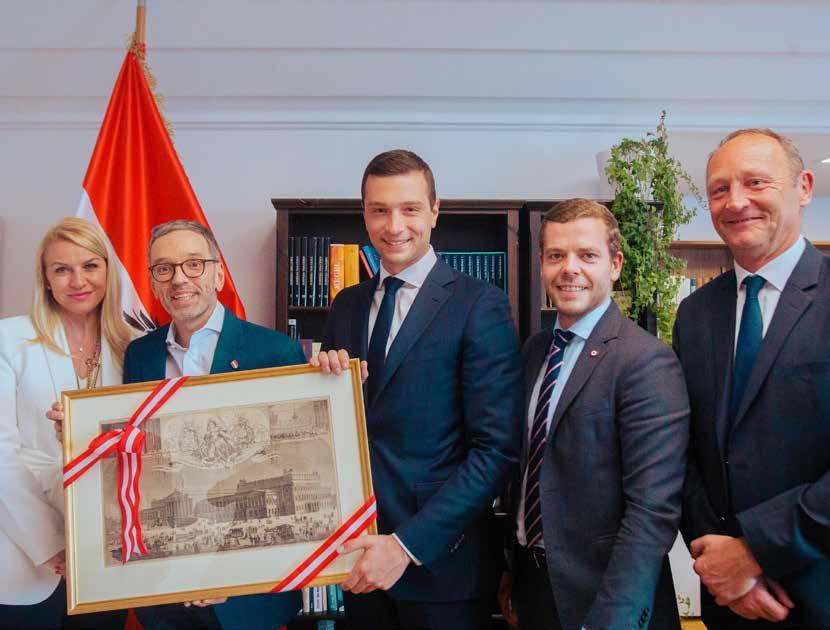
Thibaut François, francia parlamenti képviselő, a Rassemblement National (Franciaország) európai ügyekért felelős képviselője
Thibaut François, French MP and delegate for European affairs of the Rassemblement National (France) with Jordan Bardella (president of the RN) and Herbert Kickl (president of the FPÖ)
countries, such as Hungary and Poland, that are hounded and then bludgeoned because they have the misfortune not to submit to the objurgations of the Europeanists; we will strongly oppose our countries being opened up to the four winds of globalisation, which destroys jobs and landmarks and creates insecurity in even the most remote villages of France.
The Rassemblement National will never replace the French flag with the European flag, as Emmanuel Macron did under the Arc de Triomphe, but, contrary to the misconceptions spread by our political opponents, our party is not anti-European. The Europe of free nations that we are calling for refers both to an identity of civilisation, which France has largely helped to shape - through its history, its culture and its vision of democracy - and to a framework for cooperation between consenting countries represented by legitimately elected leaders - which neither Ursula von der Leyen, President of the Commission, nor Charles Michel, her counterpart on the European Council, are.
„Az európaisták elszántságával szemben minden eddiginél határozottabban a hazafiak uniójának útját kell követnünk”.
rendelkező népekre; Soha nem fogjuk abbahagyni azoknak az országoknak a védelmét, mint például Magyarország és Lengyelország, amelyeket üldöznek, majd ütlegelnek, mert szerencsétlenségükre nem hódolnak be a leghisztérikusabb európaisták gyalázkodásának; határozottan ellenezni fogjuk, hogy országainkat megnyissák a globalizáció előtt, amely munkahelyeket és nevezetességeket pusztít el, és bizonytalanságot teremt még Franciaország legeldugottabb falvaiban is.
“Faced with the determination of the proEuropeans, we must, more than ever, pursue the path of the union of patriots”
A Rassemblement National soha nem fogja lecserélni a francia zászlót az európai zászlóra, ahogyan Emmanuel Macron tette a Diadalív alatt, de a politikai ellenfeleink által terjesztett tévhitekkel ellentétben pártunk nem Európa-ellenes.
A szabad nemzetek Európája, amelyet mi követelünk, egyrészt a civilizációs identitásra utal, amelynek kialakításához Franciaország nagyban hozzájárult történelme, kultúrája és demokráciáról való felfogása révén, másrészt a legitim módon választott vezetők által képviselt, egyetértő országok közötti együttműködési keretre, amelyet sem Ursula von der Leyen, a Bizottság
This Europe of the nations is the antithesis of the European Union, an artificial and opaque construction in whose meanders leaders can impose their anti-social and anti-national policies on the people, hidden from view. Its Parliament, which should be the forum for debate, is today the stage for one of the most worrying democratic scandals of recent decades: Socialist parliamentarians are suspected of having benefited from money from Qatar to further their interests. Let’s not forget that this Gulf state is far from respecting human rights and is, in many respects, hostile to our democracies.
Faced with the determination of the Europeanists to impose their project, we must, more than ever, continue along the path of the union of patriots, through cooperation, exchanges and coordination of the votes of all the patriotic parties in the European Parliament, regardless of the group in which they sit. That’s how we’ll be able to throw our weight behind reversing the trend and giving the people of Europe back control of their own destiny.
elnöke, sem Charles Michel, az Európai Tanácsban ülő kollégája nem képvisel.
Ez a nemzetek Európája az Európai Unió ellentéte, amely egy mesterséges és átláthatatlan konstrukció, amelynek kanyarulataiban a vezetők a szem elől elrejtve ráerőltethetik társadalom- és nemzetellenes politikájukat a népekre. Parlamentje, amelynek vitafórumnak kellene lennie, ma az elmúlt évtizedek egyik legaggasztóbb demokratikus botrányának színtere: szocialista parlamenti képviselőket gyanúsítanak azzal, hogy Katarból származó pénzből részesültek érdekeik előmozdítására. Ne feledjük, hogy ez az Öböl-menti állam távolról sem tartja tiszteletben az emberi jogokat, és sok tekintetben ellenséges a mi demokráciáinkkal szemben.
Az európaisták elszántságával szemben, hogy keresztül vigyék a projektjüket, minden eddiginél jobban folytatnunk kell a hazafiak egyesítését, együttműködés, eszmecsere és az Európai Parlamentben lévő összes hazafias párt szavazatainak összehangolása révén, függetlenül attól, hogy melyik frakcióban ülnek. Így tudjuk majd súlyunkat latba vetni a trend megfordítása érdekében, és visszaadni Európa népeinek a saját sorsuk feletti irányítást.
Európai parlamenti képviselő, a Lega olasz delegációjának vezetője
Member of the European Parliament, leader of the Italian delegation, Lega
The Party I represent at the European parliament, Lega, was founded in 1989 by the merging of several regional autonomist movements. Its main political objective was to reinforce the Italian long-standing tradition of Regions and local autonomies in reforming the State in a federalist direction.
In Europe Lega has reproduced this vision, being present in the European Parliament since 1989. Throughout time, we established enduring relationships with like-minded European parties, which nowadays constitute Identity and Democracy representing more than 21 million people. Our mission is to promote a democratic Europe that lays its foundations on the cooperation of its peoples and defends traditional values, jobs and local industries.
Historically, we have strenuously opposed a European model of centralisation, which has imposed supranational public powers in many fields, eroding national sovereignty. The path towards economic and monetary integration enacted with the Maastricht Treaty is the most vivid example of Europe’s confused plan dictating irrational conditions on Member States and concurrently jeopardising a real economic expansion.
Az általam az Európai Parlamentben képviselt párt, a Lega 1989-ben alakult több regionális autonóm mozgalom egyesülésével. Fő politikai célkitűzése az volt, hogy az állam föderalista irányú reformjával megerősítse a régiók és helyi autonómiák hosszú olaszországi hagyományát.
A Lega Európában ugyanezt a jövőképet követi, mivel 1989 óta jelen van az Európai Parlamentben. Ez idő alatt tartós kapcsolatokat építettünk ki a hasonlóan gondolkodó európai pártokkal, amelyek ma az Identitás és Demokráciát alkotják, és több mint 21 millió embert képviselnek. Küldetésünk a népek együttműködésén alapuló demokratikus Európa előmozdítása, a hagyományos értékek, a munkahelyek és a helyi ipar védelme.
Történelmileg határozottan elleneztük a központosítás európai modelljét, amely számos területen nemzetek feletti kormányzást kényszerített ki, és ezzel aláásta a nemzeti szuverenitást. A Maastrichti Szerződés által meghirdetett gazdasági és monetáris integráció felé vezető út a legszembetűnőbb példája Európa zavaros tervének, amely irracionális feltételeket diktál a tagállamoknak, ugyanakkor veszélyezteti a valódi gazdasági bővülést.
Kép: Marco Campomenosi, európai parlamenti képviselő, a Lega olasz delegációjának vezetője.
Marco Campomenosi, member of the European Parliament, leader of the Italian delegation, Lega

In our vision, Europe was never envisaged to be a superstate escaping the democratic control of citizens. We uphold, on the contrary, a “doing less but better” approach, particularly in sensitive fields as defence. We believe in a community of sovereign States
A mi szemszögünkből nézve Európát soha nem úgy képzeltük el, mint egy szuperállamot, amely kívül esik a polgárok demokratikus ellenőrzésén. Éppen ellenkezőleg, mi a „kevesebbet, de jobban” megközelítést támogatjuk, különösen az olyan érzékeny területeken,
whereby convergent policy action in few and effectively managed common areas is key in creating a true system that respects the diversity of its peoples. The European bureaucratic apparatus should not be a caste but rather offer full transparency and accountability for citizens, serving an efficient protection of national players. Our vision has never changed but has only intensified in time. We remain strong our pillars and adapt them to changing political and economic circumstances, always looking for the Member States’ best interests.
Unfortunately, over the years, we have witnessed a tendency for overregulation, which has flooded Member States, economic operators and citizens with delusional rules. Such pattern was exacerbated, particularly during the current term, by a disastrous political agenda whose virtuous ambitions have not matched on ground realities. Von der Leyen Commission, supported by an ever more incomprehensible Popular-Socialists axis, has put forward a plethora of legislative interventions
„A mi szemszögünkből nézve Európát soha nem úgy képzeltük el, mint egy szuperállamot, amely kívül esik a polgárok demokratikus ellenőrzésén”.»
“In our vision, Europe was never envisaged to be a superstate escaping the democratic control of citizens”
mint a honvédelem. Hiszünk a szuverén államok közösségében, ahol a kevés számú, hatékonyan kezelt közös területen történő konvergens politikai fellépés elengedhetetlen egy olyan valódi rendszer létrehozásához, amely tiszteletben tartja népeinek sokszínűségét. Az európai bürokratikus apparátusnak nem szabad kasztnak lennie, hanem teljes átláthatóságot és elszámoltathatóságot kell biztosítania a polgárok számára, a nemzeti szereplők hatékony védelmének szolgálatában. Elképzelésünk soha nem változott, hanem erősödött az idők során. Hűek maradunk pilléreinkhez, és a változó politikai és gazdasági körülményekhez igazítjuk őket, mindig a tagállamok érdekeit szem előtt tartva.
Sajnos az évek során tanúi voltunk a túlszabályozás tendenciájának, amely őrült szabályokkal árasztotta el a tagállamokat, a gazdasági szereplőket és a polgárokat. Ezt a tendenciát - különösen a jelenlegi jogalkotási ciklusban - egy katasztrofális politikai program súlyosbította, amelynek üdvös ambíciói nem feleltek meg a valóságnak. A
that undermines the competitiveness of our industries, our agricultural production and our jobs in the face of competition by third Countries, not to mention the attacks to our fundamental spaces of freedom and democracy. The Green Deal with its ‘Fit for 55’ package, social media regulation like DSA and the Treaty reform called in the context of the ‘Conference on the future of Europe’ are few examples of such fanatic-like attitude.
In an era of systemic shocks, whereby geopolitical relations and supply chains are destabilised, Europe’s irrational ideology has exposed a poor judgment of events taking place on the global scene, leaning towards a real process of regression and deindustrialization of the entire continent. Against such background, our goal in the European arena does not change: we must be decisive in fighting dangerous and inconsistent policies that work against our security as well as our economic and social development. The only hope, in our views, is to build a strong and united European centre-right alternative to a socialist democratic majority that for too long has monopolised decision-making. Brussels must be freed from the bureaucratic drift and left-wing radicalism driving policy action and the current massive wave of protests shows European citizens have noticed the enormous damages they have caused.
Von Der Leyen-bizottság, amelyet egy egyre érthetetlenebb népi-szocialista tengely támogat, olyan jogszabályi beavatkozások sokaságát javasolta, amelyek aláássák iparunk versenyképességét, mezőgazdasági termelésünket és munkahelyeinket a harmadik országok versenyével szemben, nem is beszélve a szabadságunk és demokráciánk alapvető területei elleni támadásokról. A Green Deal a „Fit for 55” csomagjával, a közösségi média szabályozása, mint például a DSA, és az „Európa jövőjéről szóló konferencia” keretében követelt szerződésreform csak néhány példa.
A rendszerszintű sokkok korában, amikor a geopolitikai kapcsolatok és az ellátási láncok destabilizálódnak, Európa irracionális ideológiája a világ színpadán kibontakozó események téves megítéléséről árulkodott, és az egész kontinens valóságos visszafejlődési és ipartalanítási folyamata felé billent. Ennek fényében az európai színtér középpontjában álló célkitűzésünk változatlan marad: határozottan fel kell lépnünk a veszélyes és zavaros politikák ellen, amelyek a biztonságunk, valamint a gazdasági és társadalmi fejlődésünk ellen hatnak. Véleményünk szerint az egyetlen remény egy erős, egységes jobbközép európai alternatíva felépítése a szociáldemokrata többséggel szemben, amely túl sokáig monopolizálta a döntéshozatalt. Brüszszelt meg kell szabadítani a politikai cselekvést irányító bürokratikus sodródástól és a baloldali radikalizmustól, és a jelenlegi masszív tiltakozási hullám azt mutatja, hogy Európa polgárai észrevették az általuk okozott hatalmas károkat.
A Svoboda a přímá demokracie elnöke, az ID párt
elnökségének tagja
President of Svoboda a přímá demokracie, member of the ID Party Bureau
Our vision of Europe is made up of free and sovereign Nation States, all working together.
We aim to defend the “right of veto” and to overturn absurd regulations. Some studies show that Brussels dictates between 65% and 85% of our laws. That’s not our idea of democracy, it’s diktat and tyranny! Nowadays in our Parliament, we often have to make do with applying EU directives.
We want to put an end to EU subsidies that benefit harmful projects: they only serve to corrupt the elite and the industrial companies of the Nation States.
The EU aspires to become a unitary state, which is why we are firmly opposed to efforts aimed at building a common European army and police force and at establishing a common centralised foreign policy.
Our priority is also to stop illegal immigration and Islamisation. We intend to block immigration quotas, put an end to the European pact on immigration, defend our borders and expel illegal immigrants.
Multiculturalism is a disaster and a new form of racism directed against the nations and peoples of Europe. The
Európáról alkotott elképzelésünk szabad és szuverén nemzetállamok együttműködéséről szól.
Meg akarjuk védeni a «vétójogot», és véget akarunk vetni az abszurd szabályozásoknak. Egyes tanulmányok azt mutatják, hogy Brüsszel dönt a törvényeink 65-85%-áról. Mi nem így képzeljük el a demokráciát: ez önkény és zsarnokság! A Parlamentünkben ma gyakran meg kell elégednünk az uniós irányelvek alkalmazásával.
Véget akarunk vetni a káros projektek uniós támogatásának: ezek csak a nemzetállamok elitjének és iparvállalatainak korrumpálását szolgálják.
Az EU egységes állammá akar válni, ezért határozottan ellenezzük a közös európai hadsereg és rendőrség kiépítésére, valamint a közös, központosított külpolitika létrehozására irányuló törekvéseket.
Az illegális bevándorlás és az iszlamizáció megállítása is prioritás számunkra. Meg akarjuk akadályozni a bevándorlási kvótákat, véget akarunk vetni az európai bevándorlási paktumnak, meg akarjuk védeni a határokat és ki akarjuk toloncolni az illegális bevándorlókat.
A multikulturalizmus egy katasztrófa
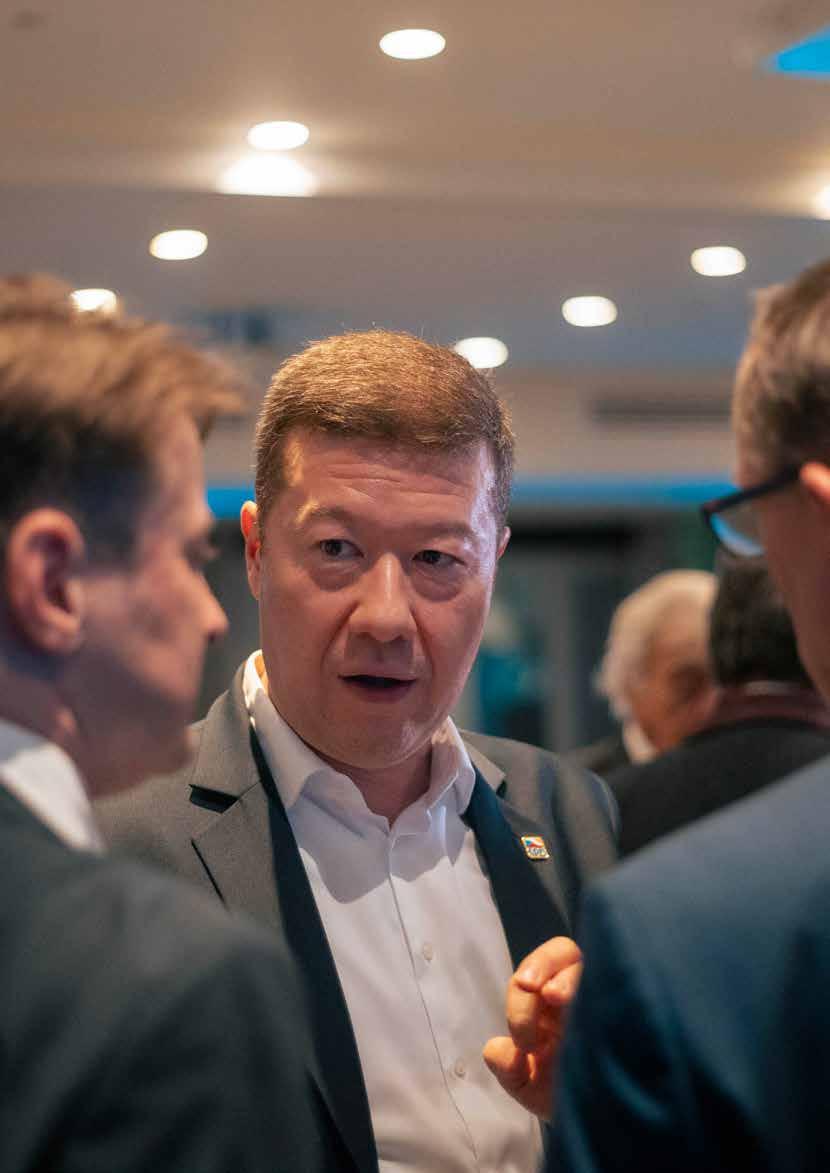
Tomio Okamura, a Svoboda a přímá demokracie elnöke, az ID párt elnökségének tagja az ID párt vezetőinek brüsszeli találkozóján.
Tomio Okamura, President of Svoboda a přímá demokracie, member of the ID Party Bureau, at the meeting of ID Party leaders in Brussels
European Union openly supports mass immigration and the Islamisation of European and EU Commissioner Ylva Johansson overtly upholds that Europe needs increasing numbers of immigrants.
The European Union is the archenemy of Europe and European nations. Common sense dictates that when I am invited into someone’s home, it is my duty to accept my host’s rules. Yet multiculturalists claim that it is up to us to adapt to the habits, rules and values of immigrants!
The EU elite is intent on destroying the nations of Europe through mass immigration. People with no homeland, no national pride and no traditional Christian values could easily be governed by the globalists who are seeking to establish a new totalitarian world order, devoid of nations, families, traditional values and religions, with a single central world power to govern all peoples and reduce them to slavery. We refuse to allow our people to be killed, raped, attacked and robbed in the streets as is currently the case in Western Europe.
és a rasszizmus új formája - Európa nemzetei és népei ellen irányul. Az Európai Unió nyíltan támogatja a tömeges bevándorlást és Európa iszlamizálását. Ylva Johansson uniós biztos nyíltan kijelenti, hogy Európának egyre több bevándorlóra van szüksége.
Az Európai Unió Európa és az európai nemzetek halálos ellensége. A józan ész azt diktálja, hogy amikor meglátogatok valakit az otthonában, kötelességem elfogadni a házigazda szabályait.
„Az Európai Unió Európa halálos ellensége”.
“The European Union is the arch-enemy of Europe and European nations”
A multikulturalisták azt állítják, hogy nekünk kell alkalmazkodnunk a bevándorlók szokásaihoz, szabályaihoz és értékeihez!
We believe that the EU’s Green Deal is extremely dangerous for our economy. We are keen to avoid this idiotic plan and exit the CO2 emissions trading scheme. We openly reject plans to ban the production of combustion engines and to force citizens to buy
Az EU elitje tömeges bevándorlással akarja tönkretenni Európa nemzeteit. A haza, nemzeti büszkeség és hagyományos keresztény értékek nélküli embereket könnyen irányíthatják a globalisták, akik egy új totalitárius világrendet akarnak létrehozni, ahol nem lesznek többé nemzetek, családok, hagyományos értékek és vallások. Csak egyetlen központi világhatalom lesz, amely minden népet kormányoz és rabszolgává tesz. Nem akarjuk, hogy népünket megöljék, megerőszakolják, megtámadják és kirabolják az utcákon, ahogyan azt Nyugat-Európában látjuk.
Az EU Green Deal-jét nagyon veszélyesnek tartjuk a gazdaságunkra nézve. Szeretnénk megszabadulni ettől az ostoba tervtől, és kilépni a CO2-kibo-
electric cars. Our vision is to restore our independence in terms of energy. We are saying “NO” to the common European currency, namely the euro, and wish to preserve our national currency, the Czech koruna, and we are also fighting for the right for citizens to pay in cash.
Censorship and political correctness are a great threat to our freedom. We emphasise civil rights and freedom of expression. We reject the “Big Brother” programme and efforts to create a central European digital identification system, etc.
We reject the Common Agricultural Policy and support a return to food self-sufficiency for our country.
We are opposed to the neo-Marxist, sexist and multicultural agenda and indoctrination, and we defend the values of the traditional family. We propose the abolition of positive discrimination for minorities and aim to put an end to the funding of political Marxist NGOs.
We advocate our citizens’ right to selfdefence and to own firearms, because the EU elite want citizens to be stripped of their weapons, to make them easier to submit.
We cherish the idea of a Europe of free nations, which is why we oppose the European Union, which is seeking to enslave them!
csátási kvóták rendszeréből. Nyíltan elutasítjuk a belső égésű motorok gyártásának betiltására és az elektromos autók állampolgárokra való rákényszerítésére irányuló terveket. A mi elképzelésünk az energiafüggetlenségünk helyreállítása. NEM-et mondunk a közös európai valutára, az euróra, meg akarjuk őrizni nemzeti valutánkat, a cseh koronát, és harcolunk a polgárok készpénzfizetési jogáért is.
A cenzúra és a politikai korrektség nagy veszélyt jelent a szabadságunkra. Hangsúlyozzuk a polgári jogokat és a véleménynyilvánítás szabadságát. Harcolunk a «Nagy Testvér» program és a központi európai digitális azonosító rendszer létrehozására irányuló törekvések stb. ellen. Elutasítjuk a közös agrárpolitikát, és támogatjuk, hogy hazánk visszatérjen az élelmiszer-önellátáshoz.
Harcolunk a neomarxista, szexista és multikulturális program és indoktrináció ellen, és megvédjük a hagyományos családot. Javasoljuk a kisebbségekkel szembeni pozitív diszkrimináció eltörlését, és szeretnénk véget vetni a marxista politikai civil szervezetek finanszírozásának.
Megvédjük a polgárok önvédelemhez való jogát és a lőfegyverek birtoklásának jogát, mert az EU elitje azt akarja, hogy a polgárokat lefegyverezzék, hogy könnyen a jobbágyaikká válhassanak.
Szeretjük a szabad nemzetek Európáját, ezért ellenezzük az Európai Uniót, amely le akarja őket igázni!
Az ID párt, Freiheitliche Partei Österreichs
Member of the ID Party Bureau, Freiheitliche Partei Österreichs
Our founding fathers dreamt of a Europe that would guarantee peace, freedom and prosperity for all. What we now have is an authoritarian bureaucracy that determines how brown chips should be, and hopes to abolish the Nation States as soon as possible. We can put a stop to this unwelcome development thanks to the forthcoming European elections.
Ursula von der Leyen is one person who will not be on the ballot paper in 2024. In 2019, she was unexpectedly elevated to the position of Commission President following a typical backroom deal in Brussels. She is the near-perfect embodiment of the elite project that the EU now stands for. In short, this avid business-airline-user has hardly ever led the life of an ordinary citizen, and hardly ever taken an interest in ordinary citizens.
This ruthless opportunist has grabbed everything she could get her hands on and, in a kind of empowerment, has taken on one issue after another, attracting ever more power to Brussels in the process: from the Green Deal to the purchasing of Coronavirus vaccines, from the European pact on migration to the war in Ukraine; Ms Von der Leyen is the figurehead of
Az alapító atyák olyan Európáról álmodtak, amely mindenki számára békét, szabadságot és jólétet biztosít. Amit kaptunk, az egy autoriter bürokrácia, amely meghatározza a sültek barnításának mértékét, és a lehető leghamarabb meg akarja szüntetni a nemzetállamokat. A közelgő európai választásokkal véget vethetünk ennek a nemkívánatos fejlődésnek.
Egyvalaki nem fog szerepelni a szavazólapon 2024-ben: Ursula von der Leyen. Őt 2019-ben meglepő módon egy tipikus brüsszeli háttéralku nyomán emelték a Bizottság elnöki posztjára. Szinte tökéletes megtestesítője annak az elitprojektnek, amivé az EU vált. Elég, ha csak annyit mondunk, hogy ez a business osztályt kedvelő rendszeres repülőgéphasználó aligha az átlagpolgár életét éli, sőt, azt is kimondhatjuk, hogy aligha érdekli őt bármennyire is az átlagpolgárok élete.
A könyörtelen opportunista mindent megkaparintott, ami a kezébe került, és egyfajta felhatalmazottként egyik aktát a másik után vette át, egyre több hatalmat vonzva Brüsszelbe: a Green Deal-től a koronavírus elleni vakcinák beszerzéséig, az európai migrációs paktumtól az ukrajnai háborúig. Von der Leyen asszony a brüsszeli centra-
Harald Vilimsky, az ID párt, Freiheitliche Partei Österreichs elnökségi tagja az ID párt római ifjúsági találkozóján
Harald Vilimsky, member of the ID Party Bureau, Freiheitliche Partei Österreichs, at the ID Party youth meeting in Rome

Brussels centralists. Her aim is to turn the EU into a kind of superstate while ensuring that the influence of current Member States is reduced to that of regional administrations. Anyone who thinks differently is branded a “rightwing extremist” by the speech police
listák vezéralakja. Célja, hogy az EU-t egyfajta szuperállammá alakítsa, ahol a jelenlegi tagállamok befolyása a regionális közigazgatásokéra csökken. Aki másként gondolkodik, azt az élősködő osztály felszólalásrendőrsége «jobboldali szélsőségesnek» bélyegzi.
of this parasitic group of people.
Yet the bourgeoisie, the socialists, the Greens and the left wing are hard to tell apart within the Brussels institutions. They form a united front when it comes to selling more and more European bureaucracy as the solution to almost everything.
We, the patriotic forces in Europe, are therefore the only alternative to increasingly authoritarian centralisation. The best way to put an end to Brussels’ thirst for power and the undesirable developments of recent years is to push back and considerably reduce the Union’s bureaucratic clout. The smaller the apparatus, the less it is able to intimidate citizens with new regulations. We need to halve the Commission, halve the European Parliament and limit it to one location, halve the 70-plus EU authorities and agencies, most of which don’t really know what they’re doing anyway.
A brüsszeli intézményekben pedig alig lehet megkülönböztetni egymástól a burzsoáziát, a szocialistákat, a zöldeket és a baloldalt. Egységes frontot alkotnak, amikor az egyre több és több európai bürokráciát akarják eladni, megoldásként szinte mindenre.
„Szövetségünk gerincét a kölcsönös előnyök adják”.
“The backbone of our cooperation is mutual benefit”
Ezért mi, az európai hazafias erők vagyunk az egyetlen alternatíva az egyre inkább tekintélyelvű centralizációval szemben. A legjobb módja annak, hogy véget vessünk Brüsszel hatalomvágyának és az elmúlt évek nemkívánatos fejleményeinek, ha visszaszorítjuk és jelentősen csökkentjük az Unió bürokratikus súlyát. Minél kisebb az apparátus, annál kevésbé tudja megfélemlíteni a polgárokat új szabályozásokkal. Felezzük meg a Bizottságot, felezzük meg az Európai Parlamentet, és korlátozzuk egy helyre, felezzük meg a több mint 70 uniós hatóságot és ügynökséget, amelyek többsége egyébként nem is igazán tudja, mit csinál.
Reducing the size of bureaucracy must come with a transfer of powers to the Nation States. Brussels should concentrate on fewer areas than it does today, but it should implement them more effectively. “European solutions” must revert to being real solutions, and not just a blind commitment to an ideology.
A bürokrácia méretének csökkentésével a hatásköröket át kell adni a nemzetállamoknak. Brüsszelnek a jelenleginél kevesebb területre kellene koncentrálnia, de ezeket hatékonyan kellene végrehajtania. Az „európai megoldásoknak” ismét valódi megoldásokká kell válniuk, és nem csupán
Underlying this is our vision of a Europe made up sovereign nations, all cooperating with each other on an equal footing. The backbone of that cooperation being mutual benefit, not the ideological fantasy of a unified state that aims to re-educate its citizens, with decisions being based on its citizens’ best interests, which is rarely the case in Brussels. In our vision, the principle of subsidiarity is not an empty word, but the backbone of our cooperation. And democracy is guaranteed because action is taken by elected government members, and not by a Commission that has morphed into a politburo.
Above all, we must put an end to mass immigration based on the misuse of the right of asylum. We must quash the deliberate renunciation of any control by European asylum legislation, which is totally absurd and dysfunctional. The uncontrolled influx of millions of people from other cultures into Europe’s social systems is undermining prosperity, security and democracy. The principle should be as follows : no asylum rights for anyone who turns up at the external border.
The forthcoming European elections are likely to mark a turning point. If current opinion polls are anything to go by, it seems that a growing proportion of European citizens will reject current Brussels policies.
egy ideológia melletti vak elkötelezettségre korlátozódni.
E mögött az egymással egyenrangúan együttműködő, szuverén nemzetek Európájáról alkotott elképzelésünk áll. Ahol az együttműködés gerincét a kölcsönös előnyök adják, nem pedig egy egységes állam ideológiai képzelete, amely át akarja nevelni polgárait. Ahol a döntéseket azon a szinten hozzák meg, amely a leginkább alkalmas a polgárok igényeinek megértésére. És ez ritkán történik így Brüsszelben.
Ahol a szubszidiaritás elve nem üres szó, hanem az együttműködésünk gerince. Ahol a demokrácia garantált, mert a választott kormányok, és nem egy politikai irodává vált Bizottság hozza meg a döntéseket. És mindenekelőtt: végre véget kell vetnünk a tömeges bevándorlásnak a menedékjoggal való visszaéléssel. Véget kell vetnünk annak, hogy az európai menekültügyi jogalkotás szándékosan lemond minden ellenőrzésről, ami teljesen abszurd és diszfunkcionális. Más kultúrákból érkező emberek millióinak ellenőrizetlen beáramlása Európa szociális rendszereibe aláássa a jólétet, a biztonságot és a demokráciát. Az alapelvnek így kell szólnia: nincs többé menedékjogi eljáráshoz való joga senkinek, aki a külső határon felbukkan.
A közelgő európai választások valószínűleg fordulópontot jelentenek.
A jelenlegi közvélemény-kutatások alapján úgy tűnik, hogy az európai polgárok egyre nagyobb hányada fogja elutasítani a jelenlegi brüsszeli politikát.
A Chega elnöke, az ID párt tagja Chairman of Chega, member of the ID Party
Let’s make 2024 a victorious year!
The time for European patriots is finally arriving, right after the next European elections!
The parties attached to the ID-Party, in almost all the countries where this great European political family is represented, are growing fast.
Some are a part of governments or on their way to form them, or at least in significant positions in their own country polls.
Examples of this, of which I am very proud, are parties such as Geert Wilders’ PVV in the Netherlands, the Rassemblement National now led by Jordan Bardella, always with the strong and experienced parliamentary leadership of the charismatic Marine Le Pen in France, the AfD led by the Chrupalla/Weidel duo, which is already the consistent second political force in Germany, quite distant from the socialists; Also Salvini’s LEGA Italia, EKRE, Vlaams Belang, SPD, or SME Rodina; Last, but not least is CHEGA, the party I’ve founded and that I’m very proud of.
In Portugal, a country where for the first time in the last fifty years, a rightwing political force obtained nearly
Legyen 2024 a győztes év!
Az európai hazafiak ideje végre elérkezett, és ez a következő európai választások után fog megvalósulni!
Az identitáshoz és a demokráciához kötődő pártok gyorsan növekednek szinte minden olyan országban, ahol ez a nagy európai politikai család képviselteti magát.
Néhányuk kormányok tagjai, kormányalakítás alatt áll, vagy legalábbis jelentős pozíciókat foglalnak el saját országuk választási eredményei alapján.
Példák, amelyekre nagyon büszke vagyok, olyan pártok, mint Geert Wilders PVV-je Hollandiában, a most Jordan Bardella által vezetett Rassemblement National, Franciaországban még mindig a karizmatikus Marine Le Pen erős és tapasztalt parlamenti vezetésével, a Chrupalla/Weidel duó által vezetett AfD, amely már a második legkoherensebb politikai erő Németországban; ugyanez a helyzet a Salvini-féle Lega, az EKRE, a Vlaams Belang és az SPD esetében is.
Végezetül, hiba lenne, ha nem említeném meg a Chega pártot, amelyet én alapítottam, és amelyre nagyon büszke vagyok. Portugáliában, egy olyan országban, ahol ötven év óta először

André Ventura, a Chega elnöke, az ID párt tagja, az ID párt lisszaboni kongresszusán.
André Ventura, Chairman of Chega, member of the ID Party, at the ID Party Congress in Lisbon
20% in the last legislative elections in March.
As a result of all this, polls have placed ID-Group as a potential third political force in the European Parliament!
It is therefore time, to start thinking about the transformation of the EU into essential matters, such as of sovereignty, the survival of European Nations or the protection of our common borders.
But also, problems such as the imposition of gender ideology by the so called “progressists”, single-mindedness, or concepts such as “political correctness”, or hypothetical “hate speech” with little or no legal definition, only to serve a leftist speech that wants to silence, intimidate, persecute, and in many cases condemn patriots and conservatives, for its own survival.
szerzett jobboldali politikai erő közel 20%-ot a parlamenti választásokon.
Eredmény: a felmérések szerint az ID-csoport az Európai Parlament potenciális harmadik politikai ereje lehet!
„Eljött a hazafiak ideje”
“The
time for European patriots is finally arriving”
Ideje tehát elgondolkodni az EU átalakításán olyan kulcsfontosságú kérdésekben, mint a szuverenitás, az európai nemzetek túlélése és közös határaink védelme. De olyan problémák megoldásán is, mint a nemi ideológia erőltetése az úgynevezett „progresszívek» által, az egyirányú gondolkodás, az olyan fogalmak, mint a «politikai korrektség», vagy a feltételezett „gyűlöletbeszéd», amelynek nincs vagy alig van jogi meghatározása, kizárólag azért, hogy egy baloldali diskurzust szolgáljon, amely a saját túlélése érdekében el akarja hallgattatni, megfélemlíteni, üldözni, és sok esetben elítélni a hazafiakat és a konzervatívokat.
So today, we finally have the ideal context to truly unite, and achieve the transformation of European Union values, which we have seen subverted over time by the power of socialists and social democrats, transforming Europeans who once were strong, into weak persons, subjugated inwards and defenseless outwards.
This is a time when the goals must be bigger than us, when we are
Ma végre megvan az ideális kontextus ahhoz, hogy valóban egyesüljünk és elérjük az Európai Unió értékeinek átalakítását, amelyeket a szocialisták és a szociáldemokraták hatalma az idők során aláásta, és az egykor bátor európaiakat legyengült, belülről alárendelt, kifelé pedig védtelen néppé változtatta.
Olyan korban élünk, amikor a célok-
experiencing global instability, that forces us to be able to make difficult decisions, in short periods of time.
Two wars have broken out on our doorstep, others are unfortunately developing, but there is one particularly dangerous within Europe: the ideological war, that is equally destructive!
Destructive of values, concepts, secular or even millennial cultures;
Destructive of homes, families, societies;
Destructive of economies, peoples’ self-determination, and countries sovereignty.
It is up to us to take this historic moment and opportunity within our hands and turn it into the salvation of this ancient and beloved continent.
Finally, this is the greatest opportunity we have, to unite, and confront socialism, that is the engine of all this destruction, transforming 2024 into a true and necessary year of victory!
nak nagyobbnak kell lenniük, mint mi magunk, amikor olyan globális instabilitást tapasztalunk, amely arra kényszerít bennünket, hogy rövid időn belül nehéz döntéseket hozzunk.
Két háború tört ki a szomszédunkban, és sajnos továbbiak is kialakulóban vannak, de van egy különösen veszélyes háború Európán belül: az ideológiai háború, amely ugyanolyan pusztító erejű! Évszázados, sőt évezredes értékeket, fogalmakat és kultúrákat rombol le. Otthonokat, családokat és társadalmakat tesz tönkre. Tönkreteszi a gazdaságokat, a népek önrendelkezését és az országok szuverenitását.
Rajtunk múlik, hogy megragadjuk ezt a pillanatot és ezt a történelmi lehetőséget, hogy újra teljes mértékben öszszekapcsolódjunk ezzel az ősi és szeretett kontinenssel.
Végre, ez a legnagyobb lehetőségünk arra, hogy egyesüljünk és szembeszálljunk a szocializmussal, amely mindezen pusztítás mozgatórugója, 2024-et a győzelem valódi és szükséges évévé változtatva!
Az Alternative für Deutschland társelnökei.
Co-leaders of Alternative für Deutschland
We associate Europe with a positive vision: a free continent in prosperity, linked through advanced infrastructure, home to a civilization with common goals. However, we are critical of the European Union because it destroys prosperity and endangers peace. We want free and peaceful trade on the continent.
As an economic and export nation, Germany is terribly affected by the EU’s sanctions policy. Unfortunately, the German government has joined the EU’s sanctions policy - with disastrous consequences both for industry and citizens. Energy prices have skyrocketed. Companies are leaving or they are at least ready to do so. Associations and entrepreneurs warn of deindustrialization. We want to terminate sanctions - for the benefit of both sides.
The EU and its elites have abandoned the founding fathers’ original idea of a European community. They want to turn the EU into a super state. Our goal is a Europe in which free nations unite and band together. Our central interests are a common market, the effective protection of the external borders against illegal immigration and strategic autonomy in questions of security
Európához pozitív jövőképet társítunk: szabad, virágzó, fejlett infrastruktúrával összekötött kontinenst, amely közös célokkal rendelkező civilizáció otthona. Ugyanakkor bíráljuk az Európai Uniót, amiért tönkreteszi a jólétet és veszélyezteti a békét. Szabad és békés kereskedelmet akarunk a kontinensen.
Németországot mint exportáló gazdasági országot rettenetesen sújtja az EU szankciós politikája. Sajnálatos módon a német kormány csatlakozott ehhez a politikához, ami katasztrofális következményekkel járt mind az iparra, mind a lakosságra nézve. Az energiaárak az egekbe szöktek. A vállalatok elhagyják az országot, vagy legalábbis erre készülnek. Egyesületek és vállalkozók a ipartalanítási figyelmeztetnek. Véget akarunk vetni a szankcióknak, mindkét fél érdekében.
Az EU és elitje feladta az alapítók eredeti elképzelését az európai közösségről. Szuperállammá akarják alakítani az EU-t. A mi célunk egy olyan Európa, amelyben a szabad nemzetek egyesülnek és összefognak. Fő érdekünk a közös piac, a külső határok hatékony védelme az illegális bevándorlással szemben, és stratégiai autonómia a biztonságpolitikában. Az európai kul-
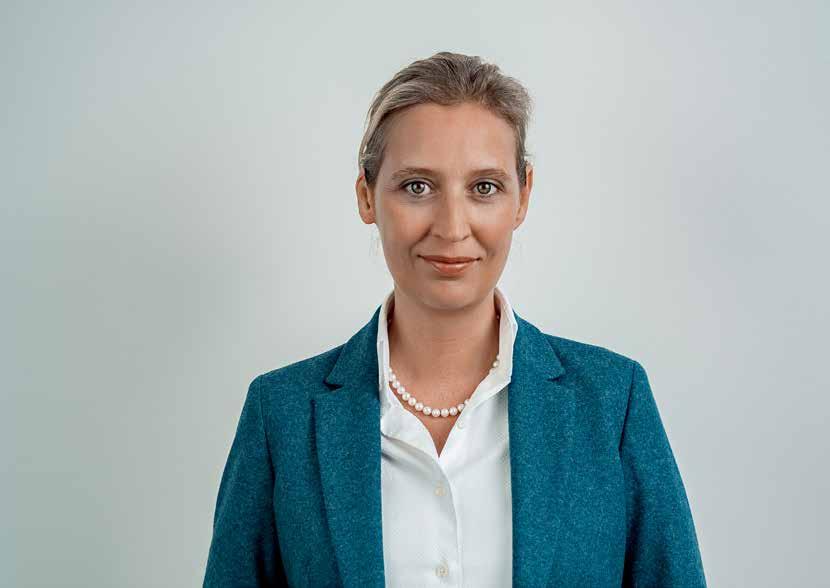
Tino Chrupalla és Alice Weidel, az Alternative für Deutschland társelnökei.
Tino Chrupalla and Alice Weidel, co-leaders of Alternative für Deutschland
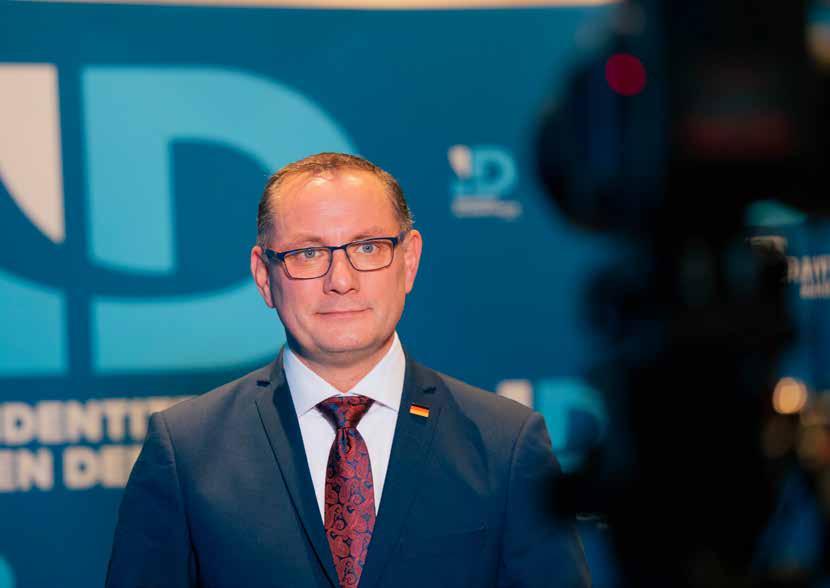
policy. The preservation of European culture and its diverse identities is a cornerstone as well. “Unity and strength to the outside world, national diversity within Europe” is what we stand for.
Europe must become a fortress - with secure national and European external borders. Frontex must be developed into a true external border police force - with a mandate for refoulement and repatriation. It is up to the nations themselves to decide their immigration policy. Everyone should live well and safely in their home country, in Germany and Italy as well as in Syria or Afghanistan. This is why we must resume diplomatic relations with these countries.
túra és sokszínű identitásának megőrzése szintén jövőképünk sarokköve. „Európán kívül egység és erő, Európán belül nemzeti sokszínűség» - ezt képviseljük.
Európának erőddé kell válnia - biztonságos nemzeti és európai külső határokkal. A Frontexnek valódi külső határrendőrséggé kell válnia, amelynek felhatalmazása van az emberek viszszafordítására és hazatoloncolására.
„Szabadság és szuverenitás az európai
“Freedom and Sovereignty for the Continent of Europe”
The green agenda is endangering our economy: Trade agreements are subjected to ethic values, and supply chains have to be documented for ethic compliance which comes at enormous expense. Homes have to be expensively renovated and retrofitted, the automotive industry is under attack. We demand respect for civilizations and respectful trade on an equal footing.
In the area of mobility, as with energy supply, there should be freedom of choice as we aim for a broad mix of offers. The car is a European invention that we should be proud of. Étienne Le-
A bevándorlási politikáról maguknak a nemzeteknek kell dönteniük. Mindenkinek képesnek kell lennie arra, hogy jól és biztonságban éljen a saját országában, Németországban és Olaszországban éppúgy, mint Szíriában vagy Afganisztánban. Ezért kell újra felvennünk a diplomáciai kapcsolatokat ezekkel az országokkal.
A zöld menetrend veszélyezteti a gazdaságunkat: a kereskedelmi megállapodások etikai értékekhez kötöttek, és az ellátási láncokat dokumentálni kell az etikai megfelelés biztosítása érdekében, ami óriási költségekkel jár. A házakat nagy költséggel kell felújítani és korszerűsíteni, az autóipart pedig támadások érik. Követeljük a civilizációk tiszteletét és a tiszteletteljes, egyenlő feltételek mellett folytatott kereskedelmet.
A mobilitás területén, akárcsak az
noir from France invented the internal combustion engine, German Carl Benz patented his automobile fueled by gas. Italians have developed the fastest engines and the most beautiful car bodies.
Our companies have helped millions of people achieve happiness and prosperity - through competition and cooperation. However, the EU wants to destroy those accomplishments. The EU decided to ban combustion engines taking effect in 2035. The EU emission standard 7 will come into force as early as 2025. It is meant to reduce NOx emissions but will increase production costs, and. Ordinary people will soon no longer be able to afford a car to commute to work or to pick up their children.
We must stop the war against the car. Individual transport means freedom!
Today, the EU stands for green coercion and the destruction of prosperity. The EU endangers the identity of nations. We want a Europe of identity and social peace, a Europe of cooperation across the continent. This is our vision for an alternative Europe.
energiaellátás területén, biztosítani kell a választás szabadságát, mert a kínálat széles skálájára törekszünk. Az autó európai találmány, amelyre büszkék lehetünk. A francia Étienne Lenoir találta fel a belsőégésű motort, a német Carl Benz pedig szabadalmaztatta gázüzemű autóját. Az olaszok fejlesztették ki a leggyorsabb motorokat és a legszebb karosszériákat.
Vállalataink emberek millióit segítették hozzá a boldogsághoz és a jóléthez a versenynek és az együttműködésnek köszönhetően. Az Európai Unió azonban tönkre akarja tenni ezeket az eredményeket. Az EU úgy döntött, hogy 2035-től betiltja a belső égésű motorokat. Az EU 7-es kibocsátási szabványa 2025-től lép hatályba. A tervek szerint csökkenteni fogja az NOx-kibocsátást, de növelni fogja a gyártási és üzemeltetési költségeket. Az átlagemberek hamarosan már nem engedhetik meg maguknak, hogy autóval járjanak dolgozni vagy a gyerekeikért menjenek. Véget kell vetnünk az autó elleni háborúnak. Az egyéni közlekedés a szabadság szinonimája!
Ma az EU a zöld kényszer és a jólét tönkretételének szinonimája. Az EU veszélyezteti a nemzetek identitását. Mi az identitás és a társadalmi béke Európáját akarjuk, a kontinensen belüli együttműködés Európáját. Ez a mi elképzelésünk egy alternatív Európáról.




Looking back at the relentless five-year headlong rush of the Europeanists
In five years, the European federalists have pushed ahead with their agenda without consulting the citizens of the Member States regarding the loss of their sovereignty. Some issues have left their mark more than others.
The Migration Pact is Europe’s promise to impose yet more immigration on us. Ever since the Marrakesh Pact was foisted on the people, the European Commission has been working in the greatest secrecy on its Migra-
Visszatekintés az európaisták ötéves fejetlen száguldására
Öt év alatt az európai föderalisták úgy törtek előre programjukkal, hogy a tagállamok polgáraival nem konzultáltak szuverenitásuk eltűnéséről. Egyes kérdéseknek különösen nagy hatásuk volt.
A migrációs paktum Európa ígérete arra, hogy még több bevándorlást kényszerít ránk. Az emberekre kényszerített Marrakeshi Megállapodás után az Európai Bizottság a legnagyobb titokban dolgozik a migrációs

tion and Asylum Pact, out of sight of the people who will have to live with it. Under the pretext of “improving the security of migrants”, the Pact will create the legal, logistical and political conditions for the mass movement and settlement of people, mainly from the Third World, on the European continent.
The multicultural model is imposing itself at the highest level of Europe-
és menekültügyi paktumon, az emberek szeme elől elzárva, akikre aztán azt rákényszerítik. A «migránsok biztonságának javítása» ürügyén a paktum megteremti a jogi, logisztikai és politikai feltételeket a főként a harmadik világból származó emberek tömeges mozgásához és letelepedéséhez az európai kontinensen.
A multikulturális modellt az európai intézmények legmagasabb szintjén
an institutions. The European Union recently launched a campaign to encourage young people to vote, featuring a veiled woman at the centre of its illustration. This is not the first time this has been done. A Council of Europe campaign, supported and co-financed by the EU, bore the slogan: “Freedom is in the hijab”.
Nobody in Europe has heard of the Conference on the Future of Europe. Although it was open to all, only a few thousand out of 500 million Europeans took part. Yet the themes were major ones: climate change and the environment, health, a stronger economy, social justice and employment, the EU in the world, values and rights, the rule of law and security, digital transformation, European democracy, migration, education, culture, youth and sport. The CoFE’s plenary debates were cataclysmic, both in terms of their poor organisation and the content of their conclusions.
This did not prevent the European Union from drawing conclusions in favour of “more Europe”, denounced by the ID Party members who took an active part in it: Hélène Laporte (France), Catherine Griset (France), Philippe Olivier (France), Mara Bizzotto (Italy), Alessandro Panza (Italy), Susanna Ceccardi (Italy), Gerolf Annemans (Flanders), Jaak Madison (Estonia), and Petra Steger (Austria).
In the autumn of 2023, at the end of the term of office, a report by the whimsical Flemish Liberal Guy Verhofstadt (Renew), voted through by the European Parliament, advocated the grad-
kényszerítik. Az Európai Unió nemrégiben kampányt indított a fiatalok június 9-i szavazásra való ösztönzésére, ahol az illusztráció középpontjában egy fátyolos nő áll. Nem ez az első alkalom, hogy ezt teszik. Az Európa Tanács egyik, az EU által támogatott és társfinanszírozott kampányának szlogenje a következő volt: „A szabadság a hidzsábban van”.
Európában senki sem hallott az Európa jövőjéről szóló konferenciáról. Bár mindenki számára nyitott volt, az 500 millió európai közül csak néhány ezren vettek részt rajta. Pedig a témák fontosak voltak: éghajlatváltozás és környezetvédelem; egészségügy; erősebb gazdaság, társadalmi igazságosság és foglalkoztatás; az EU a világban; értékek és jogok, jogállamiság és biztonság; digitális átalakulás; európai demokrácia; migráció; oktatás, kultúra; ifjúság és sport. A COfE plenáris vitái katasztrofálisak voltak, mind a rossz szervezés, mind a következtetések tartalma tekintetében.
Ez nem akadályozta meg az Európai Uniót abban, hogy a „több Európát” támogató következtetéseket vonjon le, amelyeket az ID párt aktívan részt vevő tagjai elítéltek: Hélène Laporte (Franciaország), Catherine Griset (Franciaország), Philippe Olivier (Franciaország), Mara Bizzotto (Olaszország), Alessandro Panza (Olaszország), Susanna Ceccardi (Olaszország), Gerolf Annemans (Flandria), Jaak Madison (Észtország), Petra Steger (Ausztria).
2023 őszén, a parlamenti ciklus végén a hóbortos flamand liberális Guy Verhofstadt (Renew) jelentése, amelyet
Ursula von der Leyen, President of the European Commission

ual stripping away of national sovereignty of States and the geographical enlargement of the European Union (as far as Ukraine and the countries of the Western Balkans).
The European Green Deal is a set of measures taken by the European Commission to make Europe climate-neutral, with the aim of reducing greenhouse gas emissions. While the goal of reducing Europe’s carbon footprint is commendable, it is yet another imposition by the European Union on the Member States. Above all, it paves the way for punitive ecology, which will result in the impoverishment of Europeans.
az Európai Parlament megszavazott, a nemzeti szuverenitás fokozatos leépítése és az Európai Unió földrajzi bővítése (Ukrajnáig és a nyugat-balkáni országokig) irányába ment. A Konventnek meg kell fontolnia a szerződések felülvizsgálatát.
Az Európai Zöld Megállapodás az Európai Bizottság azon intézkedéscsomagja, amely Európa klímasemlegessé tételére irányul, és amelynek célja az üvegházhatású gázok kibocsátásának 2050-ig történő csökkentése. Bár az európai szén-dioxid-kibocsátás csökkentésének dicséretes a célja, ez az Európai Unió által a tagállamokra kényszerített új intézkedés. Mindenekelőtt nyitva hagyja az ajtót a büntető ökológia előtt, amely az európaiak elszegényedését fogja eredményezni.
The European Union, so remote and so complicated: the ID Party wants to make it simpler and restore power to the people!
For most citizens, the workings and institutions of the European Union seem very vague, which we believe just goes to show that it does not meet some of the requirements of democratic life: simplicity, representativity and democracy. In just a few lines we would like to take this opportunity to introduce you to the seven main institutions.
The European Council is made up of the heads of State and government of the European Union. It is led by a President, currently the Belgian Charles Michel, who is responsible for negotiating compromises. Its object is to define the main lines of European policy, for which it meets four times a year.
The main role of the European Commission is to propose legislation and oversee the application of community policies. Although it is an essential cog in the wheel, it nevertheless suffers from a lack of democracy, since the Commissioners (one per Member State, twenty-seven in total) are not directly elected by the citizens, but proposed by the heads of State and government prior to being validated by
Az Európai Unió távoli és bonyolult: az ID Parti le akarja egyszerűsíteni, és vissza akarja adni a hatalmat az embereknek!
A legtöbb polgár számára az Európai Unió működése és intézményei nagyon homályosnak tűnik, ami véleményünk szerint azt bizonyítja, hogy nem felel meg a demokratikus élet néhány követelményének: az egyszerűségnek, a reprezentativitásnak és a demokráciának. Vállaltuk a kihívást, hogy néhány sorban bemutassuk Önöknek a hét fő intézményt.
Az Európai Tanács az Európai Unió állam- és kormányfőit tömöríti. A Tanácsot egy elnök vezeti, jelenleg a belga Charles Michel, aki a megállapodások elősegítéséért felelős. Célja az európai politika fő irányvonalainak meghatározása, és évente négyszer ülésezik.
Az Európai Bizottság fő szerepe, hogy jogszabályokat javasoljon és felügyelje a közösségi politikák alkalmazását. Bár a Bizottság alapvető fontosságú fogaskerék, mégis szenved a demokrácia hiányától, mivel a biztosokat (tagállamonként egyet, összesen huszonhetet) nem közvetlenül a polgárok választják, hanem az állam- és kormányfők javasolják, majd a Parlament hagyja jóvá.
Az 1957-ben a Római Szerződéssel létrehozott testületet jelenleg Ursula von der Leyen vezeti.
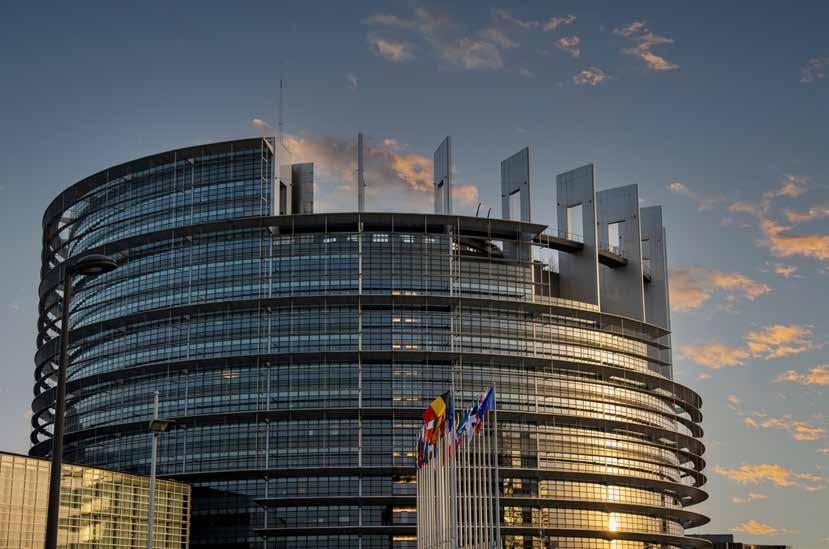
the Parliament. Established in 1957 by the Treaty of Rome, the Commission is currently headed by Ursula von der Leyen.
The Council of the European Union is the body that unites the ministers responsible for the issues under discussion (ministers of the interior, finance, etc.). It adopts European legislation with the Parliament on the basis of proposals made by the European Commission, approves (again with the Parliament) the European Union’s annual budget, formulates the common foreign and the security policy.
The European Parliament shares the prerogatives of the legislative power with the Council of the European Union. Since 1979, it has been elected by direct universal suffrage under
Az Európai Unió Tanácsa az a testület, amely a tárgyalt kérdésekért felelős minisztereket (belügyminiszterek, pénzügyminiszterek stb.) tömöríti. Az Európai Bizottság javaslatai alapján a Parlamenttel együtt elfogadja az európai jogszabályokat, jóváhagyja (szintén a Parlamenttel együtt) az Európai Unió éves költségvetését, és kidolgozza a közös kül- és biztonságpolitikát.
Az Európai Parlament a jogalkotói előjogokban az Európai Unió Tanácsával osztozik. A Parlamentet 1979 óta közvetlen és általános választójog alapján, arányos képviseleti rendszerben választják (a többségi szavazáshoz szokott országokban is), ami olykor a nemzeti parlamenteknél igazságosabb képviseletet biztosít. Az Európai Parlament hivatalos székhelye Strasbourgban van, ahol a plenáris üléseket tart-
the proportional representation system (including in countries accustomed to election on a majority basis), which guarantees a representation that is sometimes fairer than in national assemblies. The official seat of the European Parliament is in Strasbourg, where plenary sessions are held, while committee meetings are generally held in Brussels. To facilitate parliamentary work, the elected members of the national parties are divided into groups.
The Court of Justice of the European Union ensures that European law is applied properly in all Member States. It also has jurisdiction to interpret European law at the request of judges working in the various countries. It can be called upon by both the Commission and the States to assess whether or not a Member State has breached European law.
The Frankfurt-based European Central Bank defines the thrust of monetary policy and its single currency, the euro. One of the Central Bank’s top priorities since its creation has been price stability, and therefore the fight against inflation.
The Court of Auditors is responsible for analyzing the revenue and expenditure of the European Union, this external body theoretically introduces independent expertise into the management of the accounts of the institutions.
ják, míg a bizottsági üléseket általában Brüsszelben tartják. A parlamenti munka megkönnyítése érdekében a nemzeti pártok választott képviselőit csoportosítják.
Az Európai Unió Bírósága biztosítja, hogy az európai jogot valamennyi tagállamban helyesen alkalmazzák. A különböző országok bíráinak kérésére az európai jog értelmezésére is hatáskörrel rendelkezik. A Bizottság és a tagállamok egyaránt a Bíróság elé utalhatnak ügyeket annak megállapítása érdekében, hogy egy tagállam megsértette-e az európai jogot.
A frankfurti székhelyű Európai Központi Bank határozza meg a monetáris politika és a közös valuta, az euró irányvonalait. A Központi Bank egyik fő prioritása megalakulása óta az árstabilitás és ezáltal az infláció elleni küzdelem.
A Számvevőszék feladata az Európai Unió bevételeinek és kiadásainak elemzése, és ez a külső szerv elméletileg független értékelést ad az intézmények gazdálkodásáról.
The majority in the European Parliament is often described as a grand coalition between the centre-right European People’s Party (EPP) and the Socialists and Democrats (S&D), from centre-left to left. What has long held true may gradually become less so. A victory for the patriotic and conservative parties could indeed reshuffle the cards.
The continuing rise of parties belonging to both the Identity and Democracy group and the European Conservatives and Reformists will make them increasingly unavoidable in the Chamber. Occasional or more established alliances between political formations ranging from the centre-right, with the Christian Democrats in particular, to patriotic parties, could thus become a mathematical possibility.
What’s more, the left’s increasingly assertive ecological and ‘immigrationist’ delusions and its inability to defend our common identity, opting instead for wokery and cancel culture, are making it increasingly unacceptable, including to centre-right parties.
Finally, the accession to power of a growing number of parties belonging to our political sphere places them at the centre of the game and of negotiations. In any case, they are proving increasingly difficult to exclude and ignore.
Az Európai Parlament többségét gyakran úgy foglalják össze, mint a jobbközép Európai Néppárt (EPP) és a balközép szocialisták és szociáldemokraták (S&D) nagykoalíciója. Ez sokáig igaz volt, de talán egyre kevésbé lesz az. A hazafias és konzervatív pártok győzelme átrendezheti a kártyákat.
Az Identitás és Demokrácia családjához, valamint az Európai Konzervatívok és Reformistákhoz tartozó pártok folyamatos erősödése egyre inkább megkerülhetetlenné teszi őket az ülésteremben. A jobbközép politikai csoportosulások, különösen a kereszténydemokratákkal, és a hazafias pártok közötti ad hoc vagy szilárdabb szövetségek így számtani szempontból is lehetővé válhatnak.
Ráadásul a baloldal egyre magabiztosabb ökológiai és bevándorláspárti téveszméi, valamint az, hogy képtelen megvédeni közös identitásunkat, és ehelyett a wokizmust és a cancel-kultúrát részesíti előnyben, egyre kevésbé vonzóvá teszi, többek között a jobbközép pártok számára is.
Végül, a politikai szféránkhoz tartozó egyre több párt hatalomra kerülése a játék és a tárgyalások középpontjába helyezi őket. Mindenesetre egyre nehezebb őket kizárni és figyelmen kívül hagyni.


From Lampedusa to our villages, the consequences of immigration gone mad
The pictures are chilling: on this day in September 2023, several thousands of men and women (although in the minority) land on the small Italian island of Lampedusa (20 km2, and just over 6,000 inhabitants). The island has become a symbol of the unbridled immigration encouraged by the European Union.
Several thousand kilometres away, in the neighbourhoods of major cities and even in the most remote villages,
Lampedusától a falvainkig: az őrült bevándorlás következményei
A képek hátborzongatóak: 2023 szeptemberének ezen a napján több ezer férfi és nő , ugyan ez utóbbiak kevesebben vannak száll partra a kis olasz szigeten, Lampedusán (20 m2, alig több mint 6000 lakos). A sziget az Európai Unió által kívánt ellenőrizetlen bevándorlás szimbólumává vált.
Több ezer kilométerrel arrébb, a nagyvárosok környékén és még a legeldugottabb falvakban is láthatóak ennek az öngyilkos politikának a kö-
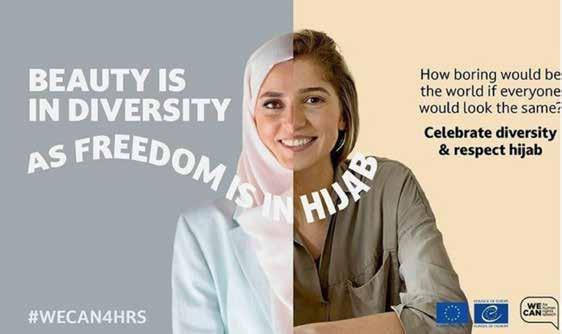
The European Union’s campaign
the cascading consequences of this suicidal policy are visible and directly borne by local populations: in Sweden, a country hitherto known for its peace and quiet, the number of rapes and assaults has increased since the country opened its borders; in France, the settling of scores between cultural and ethnic groups is on the increase, and we recently witnessed the murder of a teacher three years after that of Samuel Paty, whose throat was slit as a result of showing his students cartoons featuring the prophet Mohammed. And we have not forgotten the gang rapes of young German women on New Year’s Eve in Cologne.
Yet the leaders of the European Union are forever repeating their mantra that immigration is a good thing! But the European Commission has shaped its Migration and Asylum Pact, one of its major legislative achievements, out of sight. At its launch, Ursula von der Leyen did not hesitate to declare that “migration has always been a reality
vetkezményei, amelyeket közvetlenül az őslakosok viselnek: az eddig nyugalmáról ismert Svédországban az ország megnyitása óta megnőtt a nemi erőszak és a támadások száma; Franciaországban egyre gyakoribb a kulturális és etnikai csoportok közötti leszámolás, és nemrégiben tanúi lehettünk egy tanár meggyilkolásának, három évvel azután, hogy Samuel Paty torkát elvágták, miután Mohamed-karikatúrákat mutatott be; és emlékszünk a fiatal németek újév napján Kölnben történt csoportos nemi erőszakára.
Mégis, az Európai Unió vezetői folyamatosan azt a mantrát ismételgetik, hogy a bevándorlás jó dolog! Az Európai Bizottság azonban szem elől tévesztve alakította ki a migrációs és menekültügyi paktumot, a törvényhozás egyik legfontosabb eredményét. Ennek elindításakor Ursula von der Leyen minden további nélkül kijelentette, hogy „a migráció mindig is valóság volt Európában”, és „ezután is így lesz”. Figyelmeztettek minket.

The European Union’s campaign depicting a veiled woman
in Europe” and that it “will continue to be so”. We have been forewarned
Under the pretext of “improving the safety of migrants”, the EU’s Migration and Asylum Pact aims to create the legal, logistical and political conditions for the mass movement and settlement of people, mainly from Third World countries, on the European continent. At the same time, Europe’s borders are left unguarded. Ylva Johansson, the European Commissioner for Home Affairs, was forced to concede that 22% of people entering Europe are not subject to checks. And yet, going against every shred of common sense, she is fond of repeating that “we need immigration”.
At the very heart of the migration policy, the distribution of migrants is currently fraught with problems,
Az EU migrációs és menekültügyi paktumának „a migránsok biztonságának javítása” ürügyén az a célja, hogy megteremtse a jogi, logisztikai és politikai feltételeket a főként a harmadik világból érkező emberek tömeges mozgásához és letelepedéséhez az európai kontinensen. Ugyanakkor Európa határait nem őrzik. Ylva Johansson, az Európai Bizottság belügyi biztosa kénytelen volt elismerni, hogy az Európába belépő emberek 22%-át nem ellenőrzik. Mégis szereti ismételgetni, minden józan ész ellenére: „Szükségünk van a bevándorlásra”.
A migrációs politika középpontjában a migránsok elosztása jelenleg problematikus, mivel arra kötelezi az országokat, hogy egy évente újradefiniált migráns-kvótát telepítsenek át. Azoknak az országoknak, amelyek nem

Az ID párt kampánya a migrációs paktum ellen
The ID Party campaign against the Migration Pact
as it obliges countries to relocate a certain quota of migrants within their borders, with figures being redefined every year. Countries that refuse to take their share are required to pay €20,000 for each migrant they reject... at the taxpayer’s expense.
For the Identity and Democracy Party, all this is clearly unacceptable and mass immigration must be opposed, failing which the situation will become untenable throughout the European Union.
hajlandók átvenni a rájuk eső kvótát, minden egyes visszautasított migráns után 20 000 eurót kell fizetniük. Az adófizetők költségén.
Az Identitás és Demokrácia Párt számára mindez egyértelműen elfogadhatatlan, és a tömeges bevándorlás ellen küzdeni kell, különben a helyzet tarthatatlanná válik, az Európai Unióban mindenhol.
Much has been written about the Migration Pact. It is supposed to enable us to strengthen and better control our borders. Nothing could be further from the truth, which is why we are taking the gamble of summarising its current content.
- Illegal immigration will be replaced by irregular immigration. As a result, people who enter the country illegally will no longer be subject to criminal penalties.
- The definition of «family members» has been broadened. In addition, Member States must inform migrants of the possibilities for family reunification.
- Member States may be obliged to accept refugees, the number being set by the Commission.
- Member States must pay €20,000 for each asylum seeker not admitted.
- The European Parliament wants integration requirements to be relaxed.
- « Talent Attraction Partnerships” should fill the labour gap in the EU through agreements with non-EU countries such as Egypt, Tunisia and Morocco. Later, the aim is also to integrate Senegal, Nigeria, Pakistan and Bangladesh.
With this plan, the EU wants to legalise illegal immigration. The aim is to replace European workers with non-Eu-
A migrációs paktumról már sokat írtak. Állítólag lehetővé teszi, hogy megerősítsük és jobban ellenőrizzük határainkat. Semmi sem áll távolabb az igazságtól, ezért vállaljuk a kockázatot, hogy összefoglaljuk a jelenlegi tartalmát.
- Az illegális bevándorlás helyébe a szabálytalan bevándorlás lép. Ennek eredményeképpen az illegálisan az országba belépő embereket többé nem fogják büntetőjogi szankciókkal sújtani.
- A „családtagok” fogalmát kibővítették. Emellett a tagállamoknak tájékoztatniuk kell a migránsokat a családegyesítés lehetőségeiről.
- A tagállamok kötelezhetők a menekültek befogadására, amelynek mértékét a Bizottság határozza meg.
- A tagállamoknak minden egyes be nem fogadott menedékkérő után 20 000 eurót kell fizetniük.
- Az Európai Parlament az integrációs követelmények enyhítését szeretné.
- A „tehetségvonzó partnerségek” az EU-n kívüli országokkal, például Egyiptommal, Tunéziával és Marokkóval kötött megállapodások révén pótolnák a munkaerőhiányt az EU-ban. Később Szenegál, Nigéria, Pakisztán és Banglades bevonását is célul tűzték ki.
Ezzel a tervvel az EU legalizálni akarja az illegális bevándorlást. A cél az,

ropeans. Millions of people will thus be able to come to Europe legally.
The EU’s migration pact is a diabolical pact that undermines the sovereignty of the Member States. It threatens our security, our identity and our prosperity. Our Identity and Democracy party opposes this suicidal pact with all its might. To this end, our MEPs have also fought it through numerous amendments.
We do not want mass migration, but a halt to migration. We do not want asylum seekers to be dispersed; we want illegal immigrants to be returned to their countries of origin. We do not want compulsory solidarity, but an end to European asylum policy. We do not want open borders, but a fortress Europe.
hogy az európai munkavállalókat nem európaiakkal helyettesítsék. Így emberek milliói érkezhetnek majd legálisan Európába.
Az EU migrációs paktuma egy ördögi paktum, amely aláássa a tagállamok szuverenitását. Veszélyezteti a biztonságunkat, az identitásunkat és a jólétünket. Identitás és Demokrácia pártunk minden erejével ellenzi ezt az öngyilkos paktumot. Ennek érdekében európai parlamenti képviselőink számos módosítással is harcoltak ellene.
Nem akarunk tömeges migrációt, hanem a migráció megállítását. Nem azt akarjuk, hogy a menedékkérőket szétszórják, azt akarjuk, hogy az illegális bevándorlókat visszaküldjék származási országukba. Nem kötelező szolidaritást akarunk, hanem az európai menekültpolitika megszüntetését. Nem nyitott határokat akarunk, hanem Európa erődjét.
The European Border and Coast Guard Agency, better known as Frontex, is the focus of much attention. Although it has existed since 2004, it has only been known in its current form since 2016 in the wake of an unprecedented migration crisis. As its name suggests, its purpose is to monitor the external borders of the Schengen area.
Although it was not initially equipped to carry out border management operations, it was given new operational powers and equipped with a European corps of border guards and coast guards. The budget allocated to the agency continues to grow, from €238 million in 2016 to €750 million in 2022.
Pro-migrant NGOs and some of the media were quick to target Frontex, accusing it of violating human rights. The agency was accused of... turning back migrants trying to enter Greece from Turkey. Among ‘immigrationists’, any excuse is used to undermine the very mission of the agency.
Its French director Fabrice Leggeri was ousted in 2022 and replaced by the Dutchman Hans Leijtens. Frontex now seems to have lost the purpose of its mission: restoring Frontex to its role of guarding increasingly threatened borders and coastlines is vital.
A Frontexnek vissza kell kapnia a határok
Az Európai Határ- és Partvédelmi Ügynökség, ismertebb nevén a Frontex, nagy figyelem középpontjában áll. A 2004 óta, de jelenlegi formájában 2016 óta létező, a példátlan migrációs válság nyomán ismert szervezet céljaahogy a neve is mutatja - a schengeni térség külső határainak ellenőrzése.
Bár kezdetben nem volt feljogosítva határigazgatási műveletek végrehajtására, új operatív hatásköröket kapott, és európai határőrökből és parti őrökből álló hadtesttel szerelték fel. A számára elkülönített költségvetés is tovább nőtt, a 2016-os 238 millió euróról 2022-re 750 millió euróra emelkedett.
A bevándorláspárti nem kormányzati szervezetek és egyes médiumok gyorsan a Frontexet vették célkeresztbe, és az emberi jogok megsértésével vádolták. Az ügynökséget azzal vádolták, hogy visszafordította a Törökországból Görögországba belépni próbáló migránsokat. A bevándorláspártiak mindent megtesznek, hogy aláássák az ügynökség küldetését.
A francia igazgatót, Fabrice Leggerit 2022-ben menesztették, és helyére a holland Hans Leijtens került. Úgy tűnik, a Frontex mostanra elvesztette küldetésének értelmét: a Frontexnek vissza adni az egyre inkább fenyegetett határok és partvonalak őrzésében betöltött szerepét.
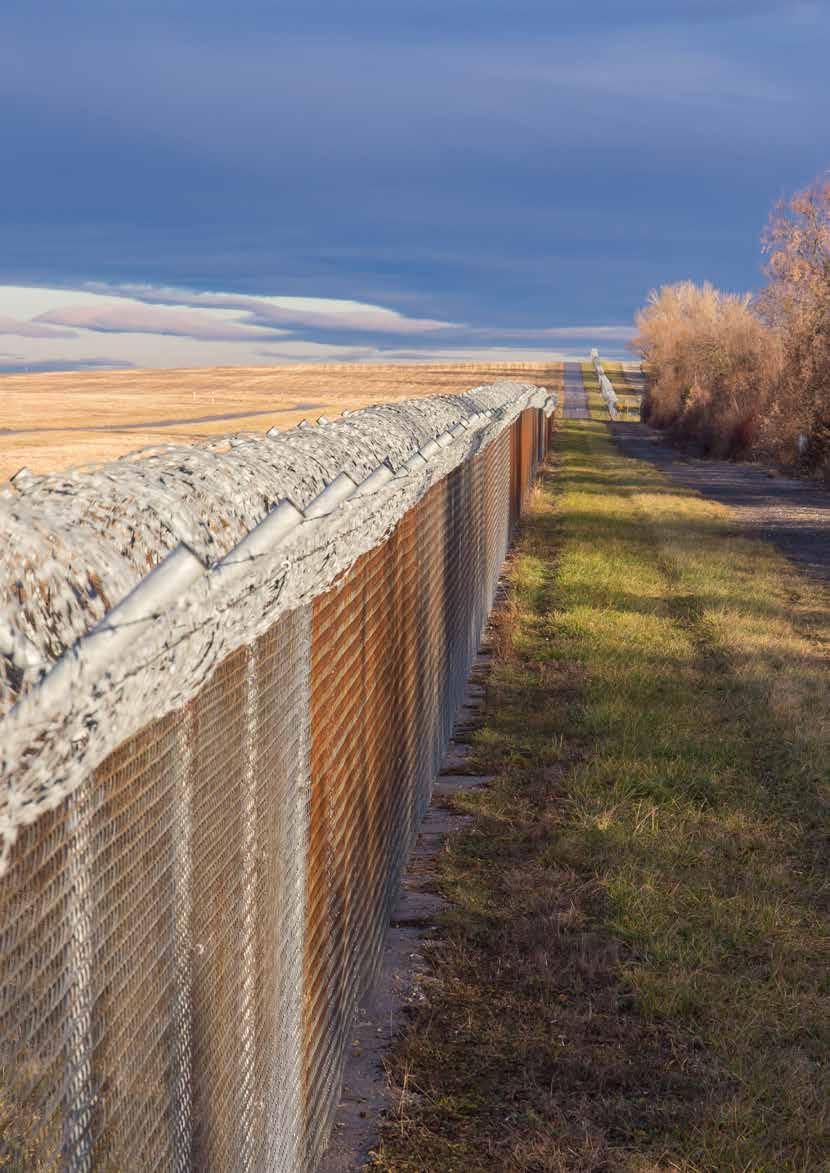


At one of its conferences held in Tallinn, the Estonian capital, in November 2022, the Identity and Democracy Party asked a somewhat provocative question regarding the European Union’s energy policies, namely “is green the new red?”
In other words, it is important to ask whether we are witnessing the emergence of a totalitarianism dictated by the need to save the planet, which has become the new leitmotiv of the ruling classes.
The European Green Deal aims to
Az Identitás és Demokrácia Párt 2022 novemberében az észt fővárosban, Tallinnban tartott egyik konferenciáján kissé provokatív kérdést tett fel az Európai Unió energiapolitikájával kapcsolatban: vajon a zöld az új piros?
Más szóval, fontos feltenni a kérdést, hogy nem egy olyan totalitarizmus kialakulásának vagyunk-e tanúi, amelyet az uralkodó osztályok új vezérmotívuma, a bolygó megmentésének szükségessége diktál.
Az európai Zöld paktum vagy Green Deal célja, hogy 2030-ig 50%-kal csök-
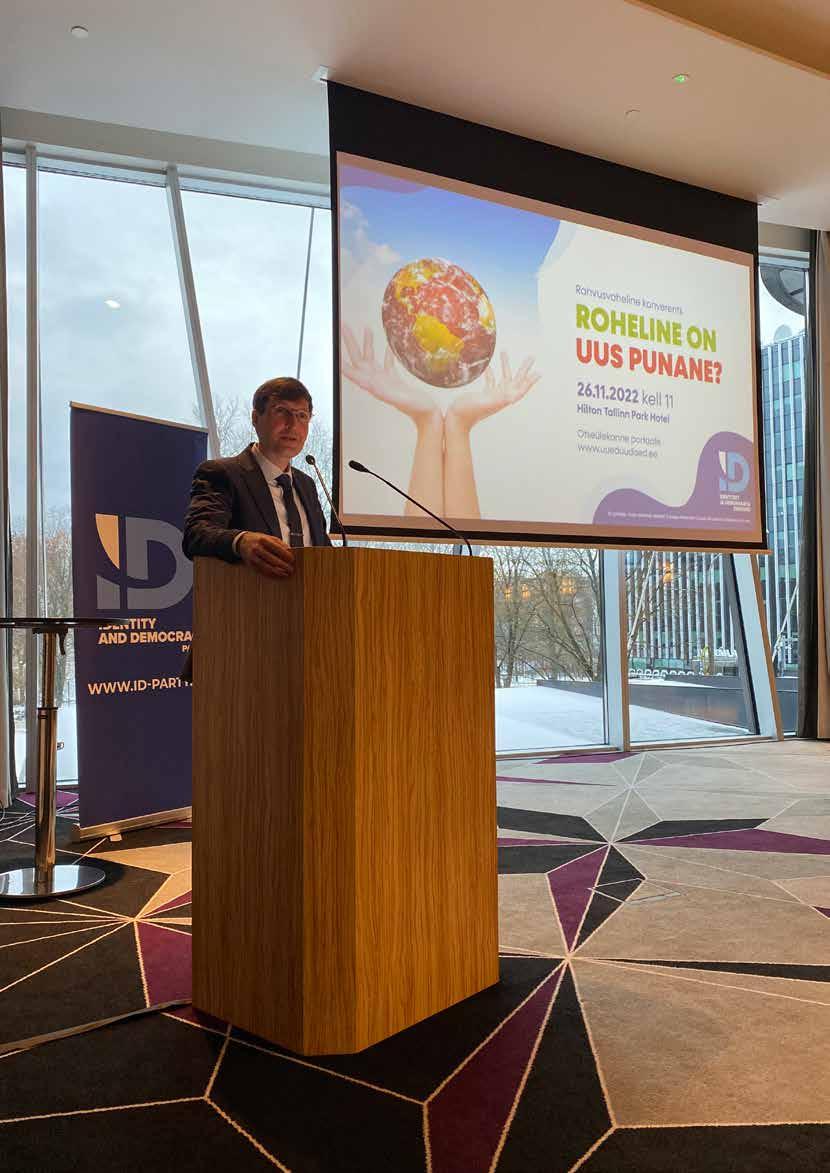
Martin Helme, EKRE, az ID párt tallinni konferenciáján a Green Dealről
Martin Helme, EKRE, at the ID Party conference on the Green Deal in Tallinn
reduce CO2 emissions by 50% by 2030, compared with 1990 levels, and to achieve carbon neutrality by the middle of the century. The objective may seem noble, since it is based on a desire to develop the circular economy that relies on local traders, craftsmen and entrepreneurs.
Although the objective itself is a noble one, European climate policy is also paving the way for taxation that will affect the lowest incomes, and for the introduction of measures that will force citizens to change their habits, even when they can’t afford to do so. They will sometimes be obliged to change their vehicles (the death of the internal combustion engine is already programmed) or to renovate their homes at exorbitant cost. Small and medium-sized businesses will also be affected by the inflation that will inevitably result from the implementation of the Green Deal.
This is how the mechanisms of punitive ecology are implemented. Yet there is another form of ecology based on proximity and the importance of promoting local products, local traders and local craftsmen.
kentse a CO2-kibocsátást az 1990-es szinthez képest, és az évszázad közepére szén-dioxid-semlegességet érjen el. A cél nemesnek tűnhet, hiszen a helyi kereskedőkre, kézművesekre és vállalkozókra épülő körforgásos gazdaság fejlesztésének szándékán alapul.
Jóllehet a cél nemes, az európai éghajlat-politika megnyitja az utat a legalacsonyabb jövedelműeket sújtó adóztatás és olyan intézkedések bevezetése előtt is, amelyek arra kényszerítik a polgárokat, hogy változtassanak szokásaikon, még ha nem is rendelkeznek az ehhez szükséges eszközökkel. Néha arra kényszerülnek majd, hogy lecseréljék járműveiket - a belsőégésű motor halálát így programozzák - vagy hogy túlzott költségekkel újítsák fel otthonaikat. A kis- és középvállalkozásokat is érinti majd a Green Deal bevezetésével elkerülhetetlenül együtt járó infláció.
Tehát a büntető ökológia mechanizmusai lépnek életbe. Ehelyett létezik egy másik ökológia, amely a közelségen és a helyi termékek, a helyi kereskedők és a helyi kézművesek támogatásának fontosságán alapul.
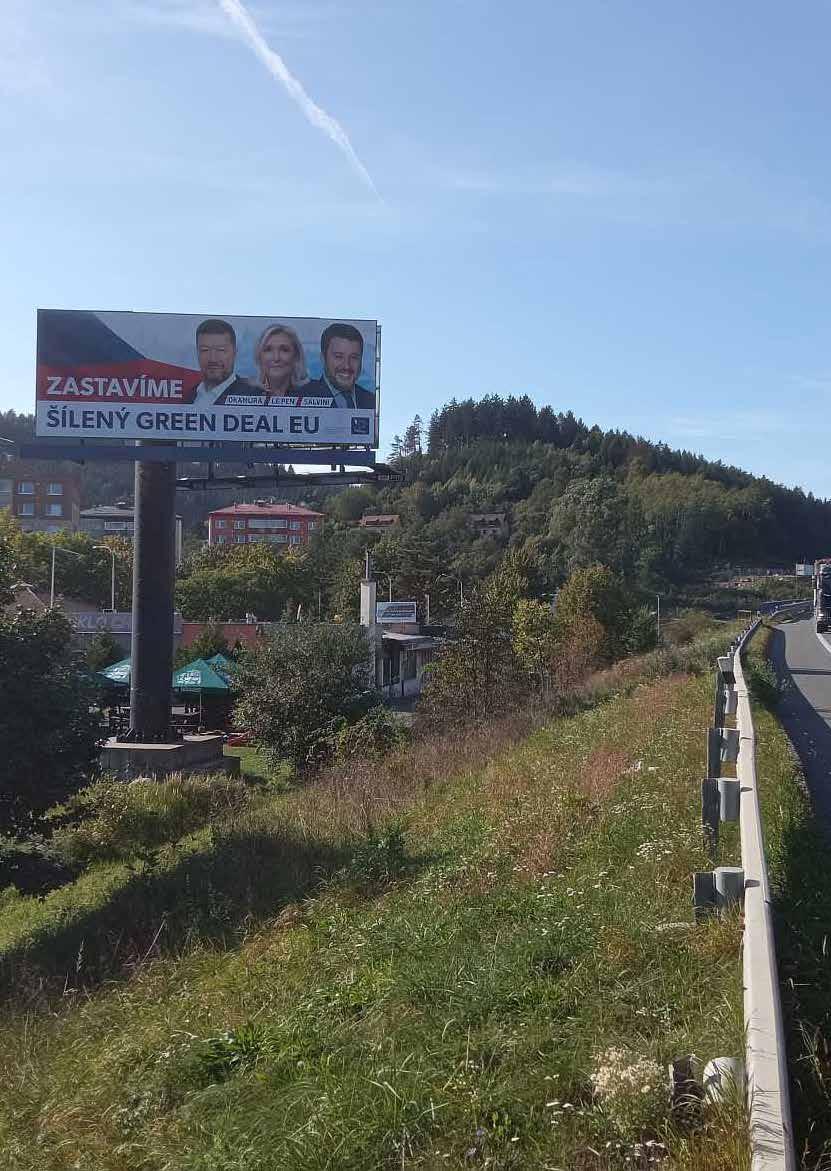
Az ID párt kampánya a Green Deal ellen
The ID Party’s campaign against the Green Deal
Farmers throughout the European Union have expressed their discontent on a number of occasions in recent months. They are the first to suffer as a result of policies pursued at European level and, in some cases, excessive transposition in matters of national law.
The wave of anger began in the Netherlands in 2019 and has crystallised over the years against a backdrop of policies put in place by Mark Rutte’s Liberal government. It was the policy aimed at reducing nitrogen emissions that lit the fuse and, more specifically, in order to achieve the objectives, the law aimed at restricting the number of animals on farms. Sporting red scarves, the “boeren” (farmers) were supported by a large part of the population.
The reason behind this popular support is obvious to everyone, all except Europe’s leaders: farmers are vital. They feed us, they work the land, they shape our landscapes and they provide environmentally-friendly quality products.
Yet today they are rarely taken into account but put in competition with breeders and producers from all over the world because of the free trade agreements signed by European leaders: at the end of 2023, the European Council once again finalised free trade agreements with New Zealand and Chile.
Az európai mezőgazdaság
A gazdák az elmúlt hónapokban többször is hangot adtak elégedetlenségüknek az Európai Unió egész területén. Ők az európai szinten folytatott politikák és egyes esetekben a nemzeti jogba való túlzott átültetés elsődleges áldozatai.
A düh megmozdulása Hollandiában 2019-ben kezdődött, és az évek során kristályosodott ki, a Mark Rutte liberális kormánya által bevezetett politika hátterében. A nitrogénkibocsátás csökkentésére irányuló politika volt az, amely olaj volt a tűzre, pontosabban a célok elérése érdekében a törvény a gazdaságokban tartott állatok számának korlátozását tűzte ki célul.
A „boeren” (gazdák) jelképével, a piros sállal a lakosság nagy része támogatta őket.
Ennek a népi támogatásnak az oka mindenki számára nyilvánvaló, kivéve Európa vezetőit: a gazdák nélkülözhetetlenek. Ők táplálnak minket, ők művelik a földet, ők alakítják a tájat, és ők biztosítják a környezetet tiszteletben tartó minőségi termékeket.
Ma mégis ritkán veszik őket figyelembe. Az európai vezetők által aláírt szabadkereskedelmi megállapodások miatt a világ minden táján lévő gazdálkodókkal és termelőkkel kell versenyezniük: 2023 végén az Európai Tanács véglegesítette az Új-Zélanddal és Chilével kötött megállapodásokat.
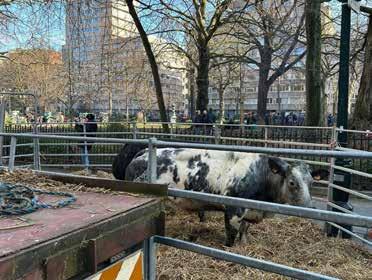

Demonstration of European farmers in Brussels in February 2024
So we now import products that cannot be produced here because of the standards imposed on farmers. There’s no rhyme or reason to any of it, and to illustrate this crazy situation, at the beginning of the year, French farmers turned all town and village name-bearing roadside plaques upside down.
Early in 2024, farmers throughout Europe took to the streets to protest against the measures put in place by the European Union. In front of the European Parliament, thousands of farmers expressed their anger at the fact that they are finding it increasingly difficult to meet their own needs.
You only have to lend an ear to understand the reasons for their anger against the sprawling European Union. They work long hours for an indecent income, are swamped by red tape, and have to comply with more and more standards…
Farmers are now at the very heart of the battle. “Without farmers, there is no country,” said one of their placards at the demonstration in Brussels. To save some is to save others.
Ennek eredményeképpen most olyan termékeket importálunk, amelyeket a gazdákra vonatkozó előírások miatt nem lehet itthon megtermelni. Megáll az ész! Szimbolikusan, az év elején a francia gazdák felfordították a táblákat a városokban és falvakban.
2024 elején a gazdák Európa-szerte fellázadtak az Európai Unió által bevezetett intézkedések ellen. Az Európai Parlament előtt gazdák ezrei adtak hangot dühüknek amiatt, hogy egyre nehezebben tudják eltartani magukat.
Csak meg kell hallgatni őket, hogy megértsük, miért dühösek a burjánzó Európai Unióra. Hosszú órákat dolgoznak tisztességtelen jövedelemért, elárasztja őket az adminisztrációs munka, és egyre több előírásnak kell megfelelniük...
A gazdák most a harc középpontjában állnak. A brüsszeli tüntetésen egyik plakátjukon ez állt: „Gazdák nélkül nincs ország”. Ha egyeseket megmentünk, azzal másokat is megmentünk.
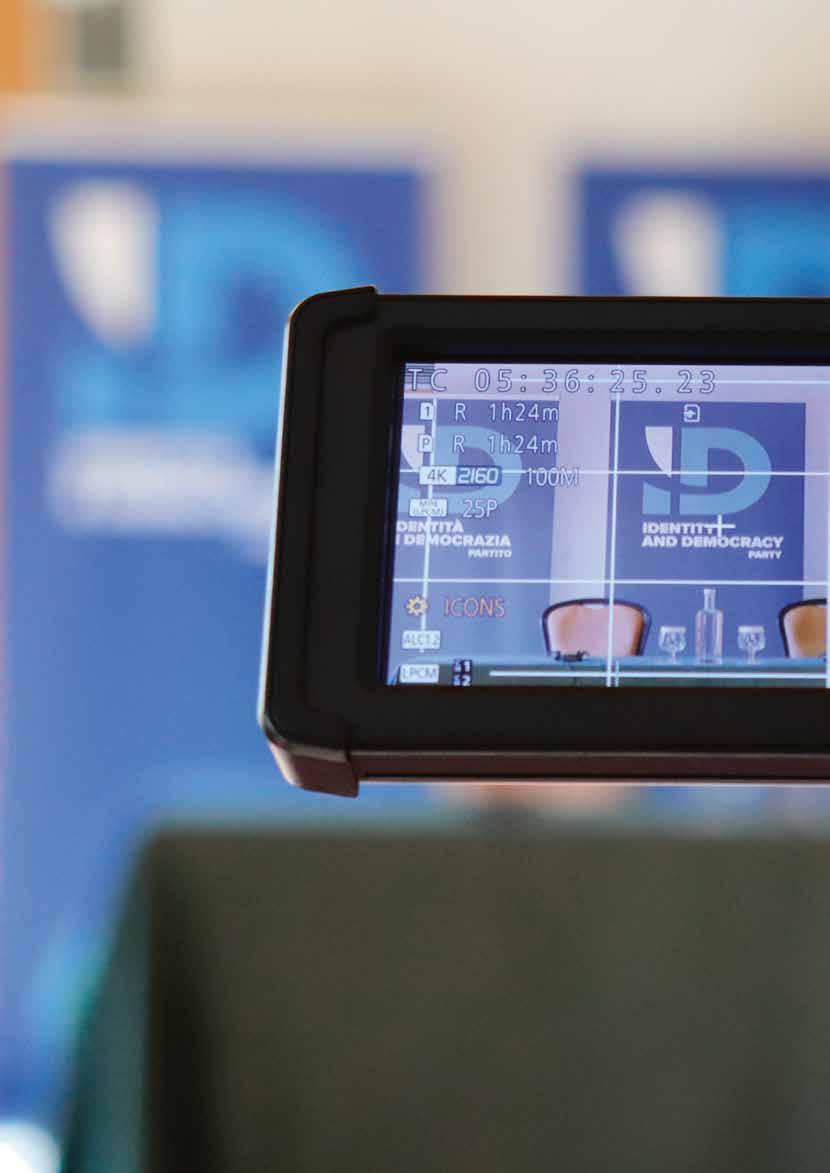
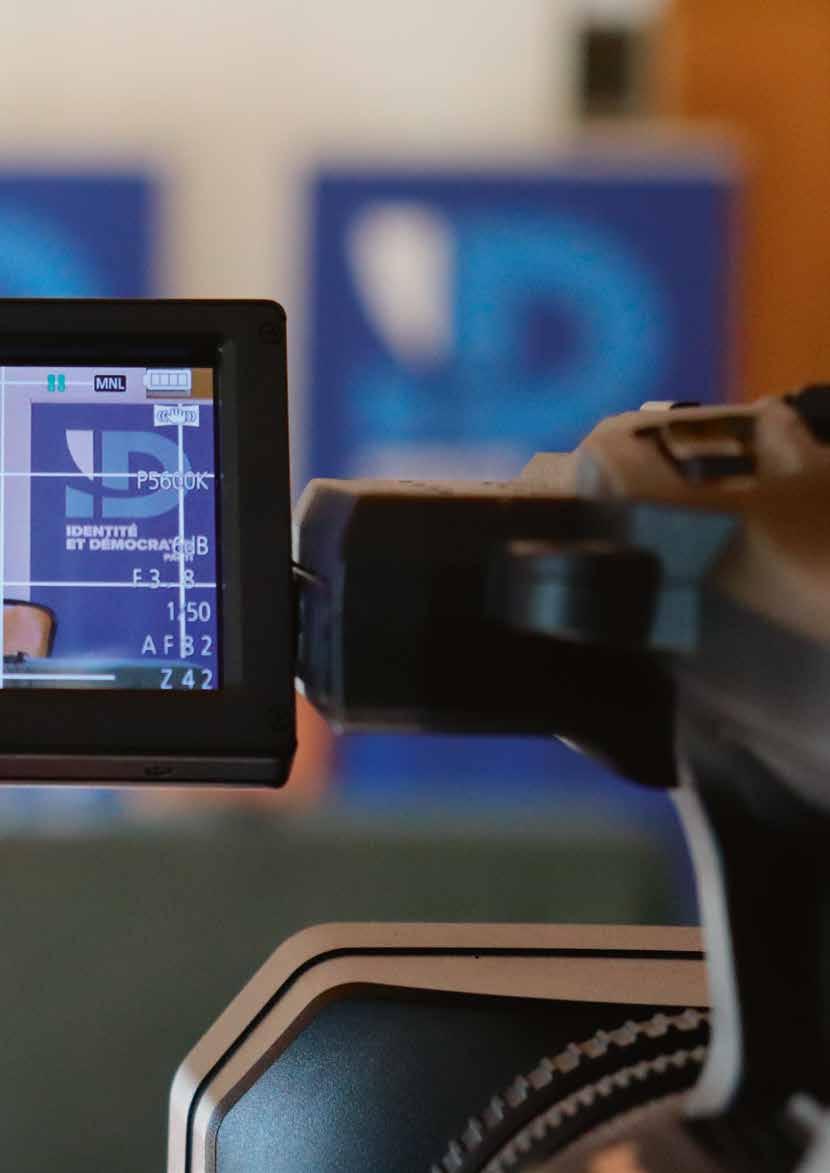
ID Party Congress: working towards a Europe based on cooperation
In Lisbon, in the magnificent setting of the former convent Convento do Beato, André Ventura, President of Chega, did a brilliant job of introducing the European meeting of the Identity and Democracy party entitled “working towards a Europe based on cooperation”: “Times are changing from east to west. Change is underway. We have been chosen to experience a unique period in history (...) We want Europe to be proud to defend its values.” It is indeed true that we are living in a time of great political upheaval that is favourable to patriots.
Harald Vilimsky, a member of the ID Party Bureau, also gave the same optimistic outlook to his speech, and he too sees a radiant future “far from war, and moving towards renewed prosperity, far from globalism and showing real respect for the specific cultural characteristics of each people, far from paternalism and by developing a new way of thinking about freedom!” But he believes there
Lisszabonban, az egykori kolostor, a Convento do Beato csodálatos környezetében André Ventura, a Chega! elnöke ragyogóan vezette be az Identitás és Demokrácia párt európai találkozóját, amelynek témája: «Az együttműködés Európája felé» volt „Keletről nyugatra, az idők változnak. A változás folyamatban van. Kiválasztottak vagyunk, hogy a történelem egy egyedülálló időszakát éljük át (...) Azt akarjuk, hogy Európa olyan kontinens legyen, amely büszkén védi értékeit». Való igaz, hogy a hazafiaknak kedvező, nagy politikai felfordulást hozó időszakot élünk.
Harald Vilimsky, az ID párt elnökségi tagja is ugyanilyen optimista megvilágításba helyezte beszédét, és ő is ragyogó jövőt lát, „a háborútól a megújuló jólét felé, a globalizmustól az egyes népek kulturális sajátosságainak valódi tiszteletben tartása felé, a paternalizmustól a szabadságról való új gondolkodásmód felé!”. ». De van egy feltétel: egyesülnünk kell, és egy egyre szélesebb politikai családot kell

Marine Le Pen, az ID párt elnökségi tagja, a közgyűlésen
Marine Le Pen, member of the ID Party bureau, during the General Assembly alkotnunk.
is one condition: we must unite and form an ever wider political family.
Unity and respect for our diversity is also the wish of Tomio Okamura, Chairman of the Czech SPD: “As citizens and nations, we are equal, but each person is different, each nation is different and each country has different needs and preferences. It is impossible to mould our peoples into uniform European directives and regulations, because what helps some harms others. Democracy is always built from the bottom up. Each country has, and must have, the right to decide what benefits it wants for itself and its citizens.”
This was also the message from Tino Chrupalla, President of Alternative für Deutschland, who stated with force and conviction that “we intend to defend the values of democracy and respect for identity. We are here to build a new Europe according to our values and our way of life (...). And our strength lies in the fact that we pursue policies that mainly our citizens.”
Sokféleségünk egyesítése és tiszteletben tartása Tomio Okamura, a cseh SPD elnöke kívánsága is: „Polgárként és nemzetként egyenlők vagyunk, de minden ember más, minden nemzet más, és minden országnak más igényei és preferenciái vannak. Nem lehet népeinket egységes európai irányelvekbe és rendeletekbe integrálni, mert ami egyeseknek segíthet, az másoknak árthat. A demokrácia mindig alulról építkezik. Minden országnak joga van és kell, hogy legyen eldönteni, milyen előnyöket hoz magának és polgárainak.»
Ez volt a mottója Tino Chrupallának, az Alternative für Deutschland elnökének is, aki határozottan és meggyőzően kijelentette, hogy „meg akarjuk védeni a demokrácia és az identitás tiszteletben tartásának értékeit. Azért vagyunk itt, hogy egy új Európát építsünk a mi értékeinknek és életmódunknak megfelelően (...). És azért leszünk erősebbek, mert olyan politikát folytatunk, amely mindenekelőtt a
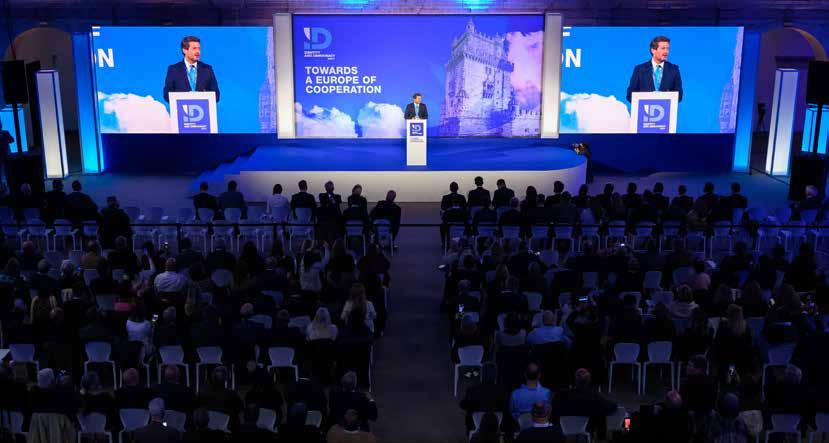
The Estonian Martin Helme, President of EKRE, reminded those present that “we must not let the left and the liberals define the issues. The left prefers to focus on plastic straws and the pay gap between men and women while our countries are being destroyed”.
After paying tribute to Geert Wilders, who had won the Dutch elections just two days earlier, ID Party President Gerolf Annemans was keen to highlight the shortcomings plaguing the European Union: “I don’t know if this translates well, but in Dutch we have a colourful expression which is ‘they’re off to confess to the devil’. This is how we express the idea that victims throw themselves into the arms of the very person who is at the origin of their problems. Confessing to the devil is a terrible mistake, and expecting the EU to solve our problems is equally a mistake.” The Flemish MEP then went on to list a number of problems attributable to the European Union: inflation, energy problems exacerbated by the Green
polgárainkat szolgálja”.
Az észt Martin Helme, az EKRE elnöke rámutatott, hogy „nem szabad hagynunk, hogy a baloldal és a liberálisok határozzák meg a kérdéseket. A baloldal a műanyag szívószálakról és a nemek közötti bérszakadékról akar beszélni, miközben országainkat tönkreteszik”.
Miután üdvözölte Geert Wilderst, aki két nappal korábban megnyerte a hollandiai választásokat, Gerolf Annemans, az ID párt elnöke igyekezett rámutatni az Európai Uniót sújtó hibákra: „Nem tudom, hogy könnyű-e lefordítani, de a holland nyelvben van egy színes kifejezés: „az ördöghöz mennek gyónni”. Így fejezzük ki, hogy az áldozatok annak a személynek a karjaiba vetik magukat, aki a problémáikat okozta. Az ördögnek gyónni szörnyű hiba, és az is szörnyű hiba, hogy az EU-tól várjuk a problémáink megoldását. „ A flamand képviselő a továbbiakban számos olyan problémát sorolt fel, amelyek az Európai Uniónak tulajdoníthatók: az inflációt,
ID Party General Assembly

Deal, and of course immigration.
Marine Le Pen, the guest of honour and member of the ID Party bureau, who is well placed in the polls for the next presidential election, reminded those present of the close ties between France and Portugal, and spoke of the fight for free nations from a European perspective. But not just any Europe: “Europe will be what we make it. It can be an opportunity for our peoples or a graveyard for our nations. We must be clear about this! I’m not confusing the Europe to which we belong through geography, history and civilisation with the European Union, which is a recent creation, artificial, ideological and out-of-touch. Europe is several thousand years old, whereas the European Union is just 70.”
a Green Deal által súlyosbított energiaproblémákat és természetesen a bevándorlást.
A díszvendég Marine Le Pen, az ID párt elnökségi tagja volt, aki a következő elnökválasztásra készülő közvélemény-kutatások szerint jó helyen áll. Miután felidézte a Franciaország és Portugália közötti baráti kapcsolatokat, európai perspektívába helyezte a szabad népekért folytatott küzdelmet. De nem akármilyen Európa: „Európa olyan lesz, amilyenné mi tesszük. Lehet egy esély a népeink számára, vagy temető a nemzeteink számára. Legyünk tisztában ezzel! Nem keverem össze azt az Európát, amelyhez földrajzából, történelméből és civilizációjából adódóan tartozunk, az Európai Unióval, amely egy új keletű, mesterséges, ideológiai és a valóságtól elrugaszkodott kreáció. Európa több ezer éves, míg az Európai Unió 70 éves.»
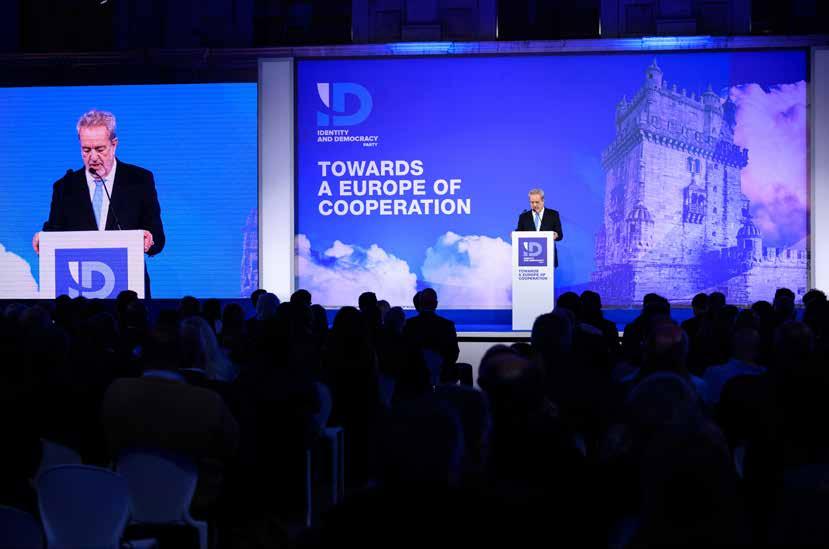
Harald Vilimsky, az ID párt elnökségének tagja, Freiheitliche Partei
Österreichs (Ausztriai Szabadságpárt)
Harald Vilimsky, member of the ID Party Bureau, Freiheitliche Partei Österreichs
Gerolf Annemans, az ID párt, Vlaams Belang elnöke
Gerolf Annemans, President of the ID Party, Vlaams Belang


Marine Le Pen, Rassemblement national, az ID párt elnökségének tagja
Marine Le Pen, Rassemblement National (RN), member of the ID Party Bureau


Martin Helme, az EKRE elnöke, az ID párt tagja
Martin Helme, President of EKRE, member of the ID Party
Rita Maria Matias, Chega !, az ID párt tagja
Rita Maria Matias, Chega, member of the ID Party
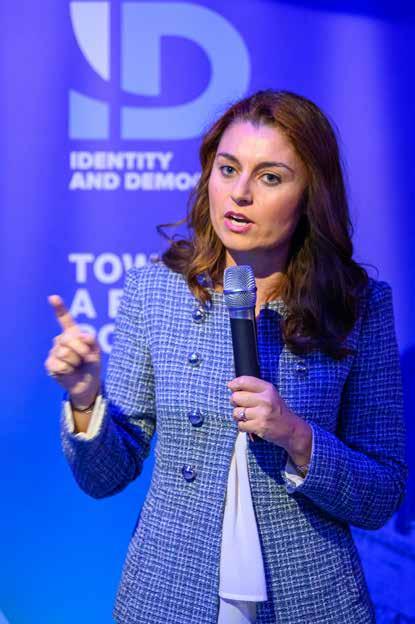
Susanna Ceccardi, európai parlamenti képviselő, Lega, az ID párt tagja
Susanna Ceccardi, Member of the European Parliament, Lega, member of the ID Party
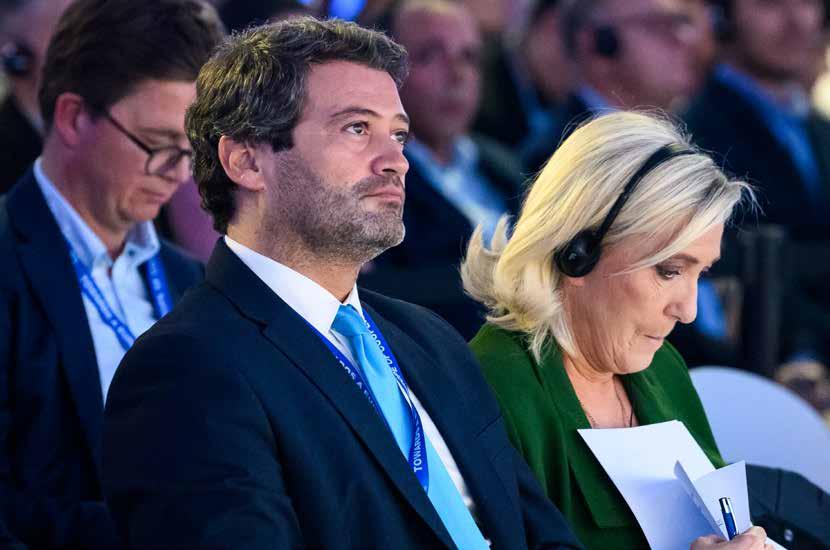
André Ventura, a Chega! elnöke és Marine Le Pen, Rassemblement National, az ID Parti tagjai.
André Ventura, president of Chega, and Marine Le Pen, Rassemblement National, members of the ID Party
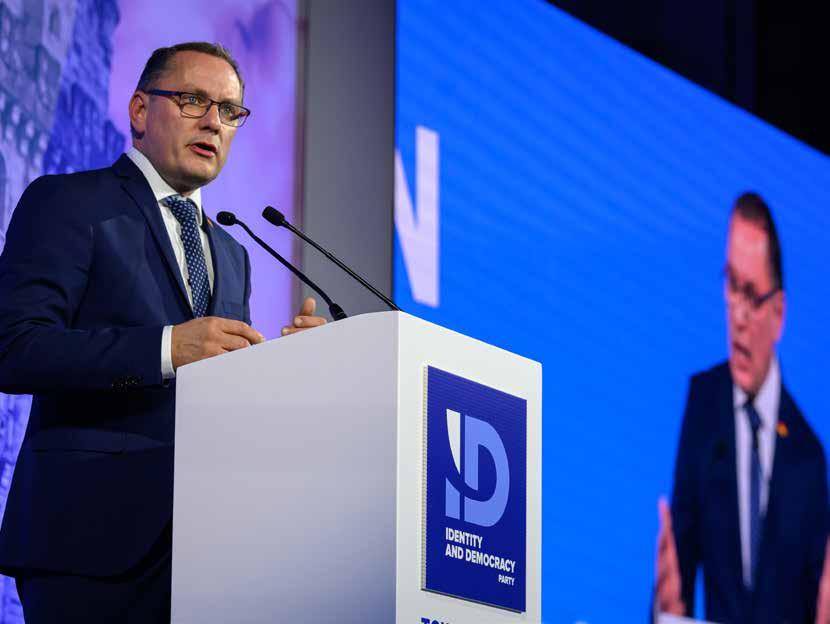
Tino Chrupalla, az Alternative für Deustchland társelnöke, az ID párt tagja
Tino Chrupalla, co-president of Alternative für Deustchland, member of the ID Party
Tomio Okamura, az SPD elnöke, az ID párt elnökségi tagja
Tomio Okamura, President of the SPD, member of the ID Party Bureau


In Brussels, the young people of the ID Party show that the future will be patriotic
Young European patriots met in Brussels in March 2023 to discuss their vision for the future of a Europe of patriots.
Speaking in front of 200 people not far from the European Parliament, Tom Van Grieken, President of Vlaams Belang, who was at home in the capital of Flanders, got straight to the heart of the matter by showing himself to be optimistic and combative: “I firmly believe that we are going to win the battle of ideas against cultural Marxism, gender ideologies and globalism. We have to do this for our children and our grandchildren!” Before adding, on a hopeful note: “Nothing is lost. The left is making more noise, but our numbers are increasing day by day”.
Marco Zanni of the Italian Lega group, also present in his capacity as President of the ID Group within the
A fiatal európai hazafiak 2023 márciusában Brüsszelben találkoztak, hogy megvitassák a hazafiak Európájának jövőképét.
Az Európai Parlamenttől nem meszsze, 200 ember előtt Tom Van Grieken, a Vlaams Belang elnöke, aki otthon, Flandria fővárosában tartózkodott, egyenesen a lényegre tapintott, optimistának és harciasnak mutatkozott: „A szívem mélyén hiszem, hogy meg fogjuk nyerni az eszmék csatáját a kulturális marxizmus, a gender-ideológiák és a globalizmus ellen. Meg kell tennünk a gyermekeinkért és unokáinkért! Mielőtt folytatnánk, egy reménysugár: „Semmi sincs veszve. A baloldal nagyobb zajt csap, de mi napról napra többen vagyunk».
Az Európai Parlament ID képviselőcsoportjának elnökeként Marco Zanni, az olasz Lega frakció tagja is jelen volt, aki azt mondta, hogy az az üléste-

Az ID Party ifjúsági találkozója az Európai Parlamentben
The ID Party youth meeting at the European Parliament

Gerolf Annemans, az ID párt, Vlaams Belang elnöke
Gerolf Annemans, President of the ID Party, Vlaams Belang
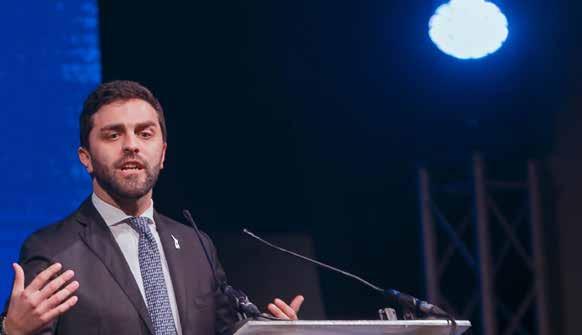
Marco Zanni, az Európai Parlament ID képviselőcsoportjának elnöke, Lega, az ID tagja
Marco Zanni, President of the ID Group at the European Parliament, Lega, member of the ID Party
European Parliament, said that the chamber in which he sits is “the least democratic in Europe. The European Commission is the most centralising, the most dirigiste institution in the world”.
Both political leaders are already in positions of responsibility despite their young age! No doubt they will serve as a source of inspiration. The leaders of the youth sections of the ID Party members then took to the floor to speak with considerable talent.
For Filip Brusselmans, president of the Vlaams Belang youth movement, the speeches were an encouragement to join the political battle, because “there is no teaching at school that is sufficiently left-wing to stop us, because we are united and stronger than ever”. The young speakers went on to list the problems in which the European States are caught up. For Maximilian Krauss, youth leader of the Austrian FPÖ, “rather than protecting our women and children, we have assimilated the fact that men from other cultures can get away with anything without any sense of justice”. Diana Chodzajanova, a young Czech member of the SPD, returned to the subject of the dangers of inflation: “All our

Luca Toccalini, a Lega Giovani elnöke, az ID párt tagja
Luca Toccalini, President of the Lega Giovani, member of the ID Party
rem, amelyben ő ül, «a legkevésbé demokratikus Európában». Az Európai Bizottság a világ leginkább központosító, dirigáló intézménye».
Itt van két politikai vezető, akik már fiatalon felelősségteljes pozícióban vannak! Kétségtelenül inspirációs forrásként szolgálnak majd. Ezután az ID párt tagpártjai ifjúsági tagozatainak vezetői szólaltak fel, szintén nagy tehetséggel.
A beszédek közös politikai harcra ösztönöztek, mert Filip Brusselmans, a Vlaams Belang ifjúsági mozgalom elnöke szerint „nincs olyan tanítás az iskolában, amely elég baloldali lenne ahhoz, hogy megállítson minket, mert egységesek és erősebbek vagyunk, mint valaha». A fiatalok pedig sorra vették azokat a problémákat, amelyekbe az európai államok belekeveredtek. Maximilian Krauss, az FPÖ osztrák ifjúsági mozgalom vezetője szerint «ahelyett, hogy megvédtük volna nőinket és gyermekeinket, inkább azt a tényt sajátítottuk el, hogy más kultúrákból származó férfiak mindenféle igazságszolgáltatás nélkül megúszhatnak bármit». Diana Chodzajanova, az SPD fiatal cseh képviselője az infláció veszélyeiről beszélt: „Minden országunkban meg kell küzdenünk az


Maximilian Krauss, Ausztria
Szabadságpártja, az ID Parti tagja
Maximilian Krauss, Freiheitliche Partei
Österreichs, member of the ID Party
countries are confronted with inflation, which is making people poorer.”
Delivering a speech in praise of Homer, whose teaching is one of the foundations of European identity, Pierre-Romain Thionnet, President of the Rassemblement National youth movement, also stressed the importance of educating children: “Rather than asking what kind of world we are going to leave to our children, ecologists should be asking what kind of children we are going to leave the world to.”
Jordan Bardella, President of the Rassemblement National and member of the Identity and Democracy Party bureau, highlighted his vision of Europe: “Our vision of Europe is not frozen in the past. It looks to the future. It is looking towards aeronautics, the conquest of space, artificial intelligence, economic power and technological progress.”
The following day, the younger generation met at the European Parliament to debate the issues currently under discussion throughout the European continent.
inflációval, amely szegényebbé teszi az embereket».
Pierre-Romain Thionnet, a Rassemblement National ifjúsági mozgalom elnöke, aki a beszédében Homéroszt méltatta, akinek tanítása az európai identitás egyik alapja, szintén a gyermekek nevelésének fontosságát hangsúlyozta; „Amikor az ökológusok felteszik a kérdést, hogy milyen világot hagyunk a gyermekeinkre, akkor elkerülik a másik kérdést: milyen gyermekeket hagyunk a világra?»
Az est fénypontjaként Jordan Bardella, a Rassemblement National elnöke és az Identitás és Demokrácia Párt elnökségi tagja hangsúlyozta Európa vízióját: „Az Európáról alkotott elképzelésünk nem ragadt meg a múltban.
A jövőbe tekint. A repülés, az űr meghódítása, a mesterséges intelligencia, a gazdasági hatalom és a technológiai fejlődés felé tekint.
Másnap a fiatalok az Európai Parlamentben találkoztak egymással, hogy mélyebben megtárgyalják az európai kontinensen vitatott kérdéseket.
In Rome, to embrace our common heritage and build for the future
Under the title “Embracing our heritage to build our future”, younger members of the Identity and Democracy Party and other European patriotic parties met in Rome in autumn 2023.
A total of no fewer than 16 nationalities were represented in the Eternal City.
In his welcome address, Matteo Salvini, President of the Lega and member of the ID Party, delivered a message of hope to the younger generation, calling on them to build a Europe based on strong cooperation and to never give up, an attitude that has enabled him to remain at the centre of the political game in Italy. Remaining steadfast at all times is a must.
After a visit to the Chamber of Deputies, the young people took part in three round-table discussions on the theme of shared identity fuelled by
„Karoljuk fel örökségünket, hogy építsük a jövőnket» címmel az Identitás és Demokrácia Párt tagpártjainak és más európai hazafias pártoknak a fiataljai 2023 őszén találkoztak Rómában.
Összesen nem kevesebb, mint 16 nemzetiség képviseltette magát az Örök Városban.
Matteo Salvini, a Lega elnöke és az ID párt tagja köszöntőjében a remény üzenetét adta át a fiataloknak, arra szólítva fel őket, hogy építsenek egy erős együttműködésen alapuló Európát, és soha ne adják fel - ez a hozzáállás tette lehetővé, hogy Olaszországban a politikai játszma középpontjában maradjon. Következetesség, mindig következetesség.
A képviselőházban tett látogatás után a fiatalok három kerekasztal-beszélgetésen vettek részt a nemzeti identitások egymást kiegészítő jellegéből
Filip Brusselmans, a Vlaams
Belang Jongeren elnöke, az ID párt tagja
Filip Brusselmans, President of Vlaams
Belang Jongeren, member of the ID Party

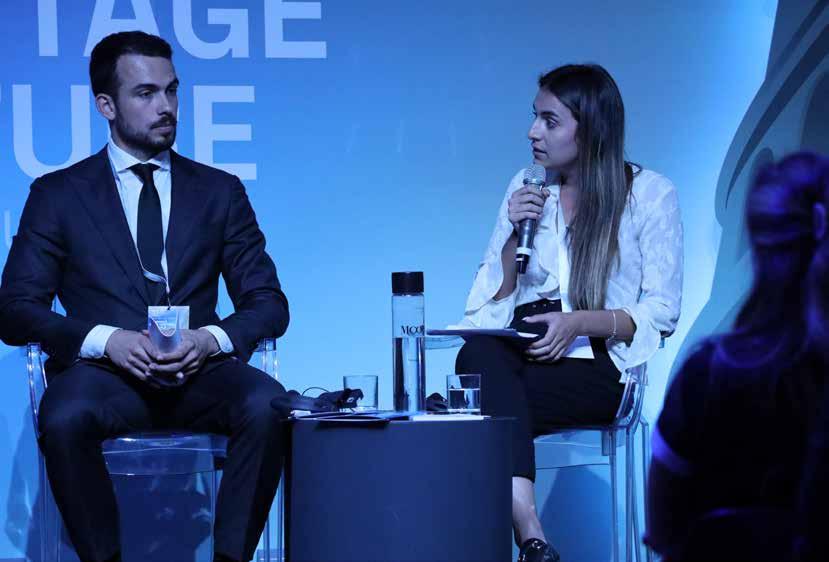
Pierre-Romain Thionnet, Rassemblement National, és
Rita Maria Matias, Chega!, az ID Párt tagjai
Pierre-Romain Thionnet, Rassemblement National (RN), and Rita Maria Matias, Chega, members of the ID Party


Az ID párt fiataljai az Olasz Köztársaság Parlamentje előtt
ID Party Youth in front of the Parliament of the Italian Republic
the complementary nature of national identities.
The first panel focused on understanding the notion of Europe as a civilisation. According to Pierre-Romain Thionnet, President of the Rassemblement National de la Jeunesse, “Europe did not come into being in 1992, it did not begin with the treaty signed in Rome in 1957, nor was it born with Jean Monnet or Robert Schuman. Europe originated in Greece.”
And now more than ever, that identity is under threat as a result of wokery and cancel culture in particular. “Communism didn’t fall after the Soviet Union, and it has continued to develop. Traditional family values are seen as an enemy by the left, as are the individual histories of each country,” said Rita Maria Matias, President of the Chega youth movement.
The second roundtable discussion was specifically devoted to the dangers we will have to contend with. These inevitably included immigration. For Filip Brusselmans, leader of the Vlaams Belang Jongeren, “Flanders’ values are threatened by the migratory invasion. Europe is the key to dealing with this influx of people: let’s work together to build solid borders”.
The theme discussed by the third panel concerned the various challenges that young patriots will have to deal with in coming years, and environmental and energy issues in particular. Selon Eino Rantanen, president de Blue Awakening, section jeune du parti estonien EKRE, “the real green
táplálkozó közös identitás témájában.
Az első panel célja Európa mint civilizáció fogalmának meghatározása volt. Pierre-Romain Thionnet, a Rassemblement National de la Jeunesse elnöke szerint «Európa nem 1992-ben született, nem az 1957-ben Rómában aláírt szerződéssel, és nem Jean Monnet vagy Robert Schuman születésével. Európa Görögországban született. »
És ez az identitás ma több mint veszélyeztetett, különösen a wokizmus és a cancel-kultúra által. „A kommunizmus nem bukott meg a Szovjetunió után, és tovább fejlődött. A hagyományos családi értékeket a baloldal ellenségnek tekinti, ahogyan az egyes országok egyéni történelmét is» - magyarázta Rita Maria Matias, a Chega ifjúsági mozgalom elnöke.
A második kerekasztal-beszélgetés éppen a ránk leselkedő veszélyekkel foglalkozott. Ezek egyike elkerülhetetlenül a bevándorlás volt. Filip Brusselmans, a Vlaams Belang Jongeren vezetője szerint „Flandria értékeit veszélyezteti a migrációs invázió. Európára van szükség, hogy megbirkózzon ezzel az emberáradattal: dolgozzunk együtt a szilárd határok kiépítésén».
A harmadik panel témája a következő évek különböző kérdései és a fiatal hazafiak előtt álló kihívások voltak, különös tekintettel a környezetvédelmi és energetikai kérdésekre. Eino Rantanen, az észt EKRE párt ifjúsági elnöke szerint „az igazi zöld elkötelezettség a jobbközép erők programjaiban és szellemiségében rejlik. Valami hasznosat kell tennünk a jövő generációi
commitment lies in the programmes and in the spirit of the centre-right forces. We must do something useful for future generations, but we must act wisely, such as investing in nuclear power, a clean source of energy that will increase the independence of each country’s energy supply.”
In his closing remarks, Chega President André Ventura reminded us of the importance of defending our identity. “We who are committed to defending our civilisation are the true Europeans, not the Marxists who spread left-wing propaganda in schools and universities. Tell everyone that the right-wing is the future and that we will win!”
számára, de ésszerűen, például befektetni az atomenergiába, egy tiszta energiaforrásba, amely erősíti minden állam energiafüggetlenségét». »
Végezetül André Ventura, a Chega elnöke utoljára emlékeztetett identitásunk védelmének fontosságára. „Mi, akik elkötelezettek vagyunk civilizációnk védelmében, mi vagyunk az igazi európaiak, nem pedig a marxisták, akik baloldali propagandát terjesztenek az iskolákban és egyetemeken. Mondják el mindenkinek, hogy a jobboldalé a jövő, és hogy győzni fogunk!»
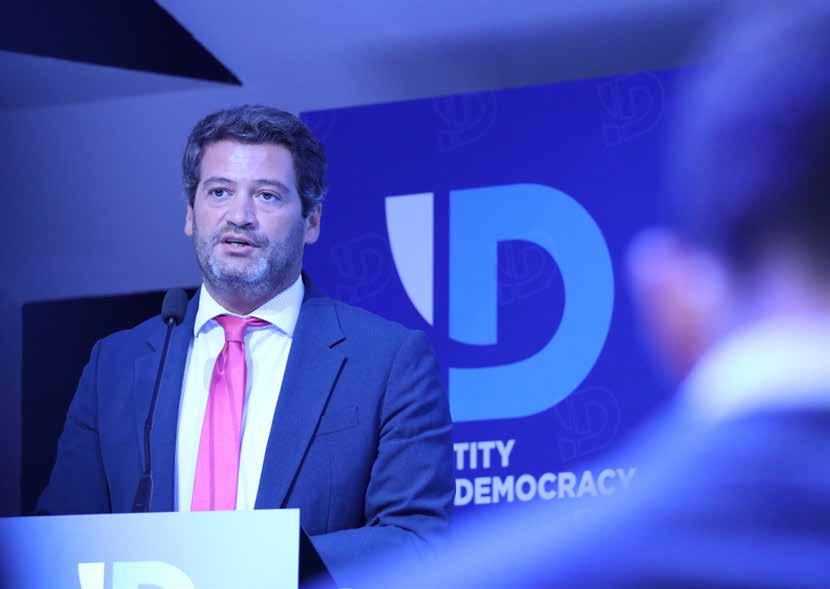
André Ventura, a Chega! elnöke és az ID párt tagja
André Ventura, President of Chega, member of the ID Party
A look back at a term of office marked by meetings, events and conferences
2022 meeting in Antwerp : “Our Europe”
“We have opted for Enlightenment; we are for security, for sovereignty and for freedom; we embrace our JudeoChristian civilisation” (Geert Wilders)
“The EU, like the USSR, is a travesty of democracy. The will of the people is never entirely respected by the ruling class” (Martin Helme)
találkozó 2022
«A megvilágosodást választjuk; a biztonság, a szuverenitás és a szabadság mellett vagyunk; a zsidó-keresztény civilizációnk mellett döntünk.» (Geert Wilders)
«Az EU-ban, akárcsak a Szovjetunióban, ez a demokrácia paródiája. Az uralkodó osztály soha nem tartja tiszteletben a nép akaratát.» (Martin Helme)

Tom Van Grieken, a Vlaams Belang elnöke, az ID Parti tagja
Tom Van Grieken, president of Vlaams Belang, member of the ID Party


Varga Judit, magyar igazságügyi miniszter (2019-2023)
Judit Varga, Hungarian Minister of Justice (2019-2023)

Harald Vilimsky, Geert Wilders és Martin Helme
Harald Vilimsky, Geert Wilders and Martin Helme
“The EU has changed since the first treaties and adopted a totalitarian style, as illustrated by its attitude towards Hungary, which is now spearheading resistance. This abuse of power reaches far and wide seeing as the EU has no qualms about working to change people’s mindsets in order to impose its ideology” (Jean Paul Garraud)
„Az EU az első szerződések óta fejlődött, és totalitárius stílust vett fel, amint azt az ellenállás élére állt Magyarországgal szembeni hozzáállása is mutatja. Ez a hatalommal való visszaélés messzire vezet, mivel az EU nem rest azon dolgozni, hogy megváltoztassa az emberek mentalitását annak érdekében, hogy ráerőltesse ideológiáját” (Jean Paul Garraud).

Jean-Paul Garraud, az ID képviselőcsoport francia delegációjának vezetője az Európai Parlamentben
Jean-Paul Garraud, leader of the French delegation of the ID group at the European Parliament
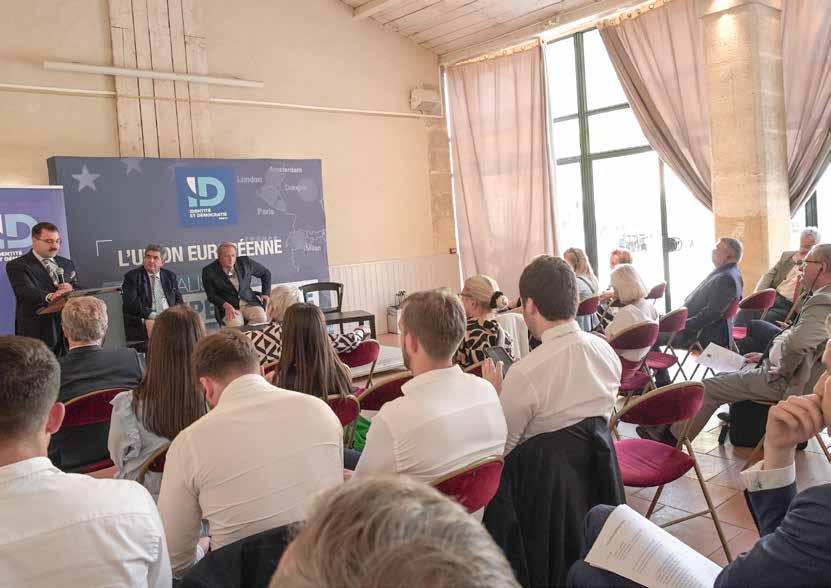

Philippe Olivier, európai parlamenti képviselő, az ID párt tagja
Philippe Olivier, Member of the European Parliament, member of the ID Party
“Through their lack of action and needless chatter, Europe’s leaders are directly responsible for the industrial evisceration of the continent, which will lead to the economic collapse of our countries and the social decline of our peoples” (Jordan Bardella)
„Tétlenségükkel és haszontalan fecsegésükkel Európa vezetői közvetlenül felelősek a kontinens ipari kizsigereléséért, ami országaink gazdasági öszszeomlásához és népeink társadalmi hanyatlásához fog vezetni» (Jordan Bardella).
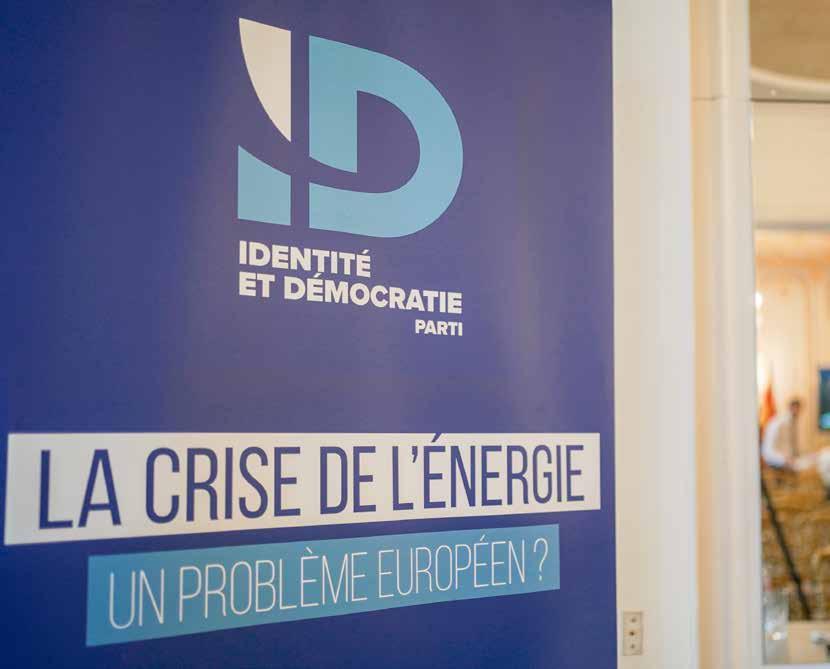

Jordan Bardella, a Rassemblement National elnöke, az ID párt elnökségi tagja
Jordan Bardella, President of the Rassemblement National, member of the ID Party bureau

Mathilde Androuët, európai parlamenti képviselő, az ID Alapítvány elnöke
Mathilde Androuët, Member of the European Parliament, President of the ID Foundation

PÁRTOK

Patriots are taking the reins of power across
The political scene has changed radically in recent years. Whereas patriotic parties were in the opposition, more and more of them are now making their presence felt in government, on the strength of their electoral results; elsewhere, as in France, they are on the threshold of power, with the presidential elections of 2027 in mind; and finally, in some countries, young parties are rapidly imposing themselves within the political arena.
Let’s start with the countries where patriotic political forces have long been part of the political landscape and are (or have been) in power.
In Italy, after the early resignation of the Draghi government, whose various parties had failed to reach an agreement, Italians sent a clear message by voting in favour of the right-wing parties. The government presented a month later included Fratelli d’Italia, the Lega (a member of the ID Party) and Forza Italia. Matteo Salvini, a leading figure in the Lega, is now Deputy Prime Minister of Italy and Minister for Infrastructure and Sustainable Mobility.
A politikai térkép gyökeresen megváltozott az elmúlt években. Míg korábban a legtöbb országban ellenzékben voltak, a „cordon sanitaire” mögé rejtőzve, egyre többen jutnak be a kormányba a választási eredményeknek köszönhetően; máshol, például Franciaországban, a hatalom küszöbén állnak, a 2027-es elnökválasztás előtt; és végül, néhány országban a fiatal pártok gyorsan nyomot hagynak a politikai színtéren.
Kezdjük áttekintésünket azokkal az országokkal, ahol a hazafias politikai erők már régóta részei a politikai palettának és hatalmon vannak (vagy voltak).
Olaszországban a Draghi-kormány korai lemondása után, amelynek különböző pártjai már nem tudtak megegyezni egymással, az olaszok egyértelmű üzenetet küldtek azzal, hogy a jobboldali pártokra szavaztak. Az egy hónappal később bemutatott kormány a Fratelli d’Italia, a Lega (az ID párt tagja) és a Forza Italia pártot tömöríti. A Lega egyik vezető alakja, Matteo Salvini most miniszterelnök-helyettes, valamint az infrastruktúráért és fenn-
Tino Chrupalla and Tomio Okamura
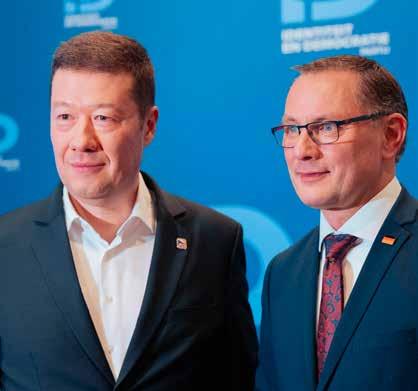
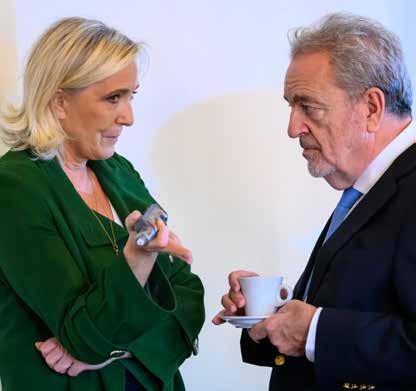
Marine Le Pen és Gerolf Annemans
Marine Le Pen and Gerolf Annemans
In Austria, Freiheitliche Partei Österreichs (a member of the ID Party) is considering a return to power, not as a minor partner in a coalition, but as its driving force. The polls show that the party currently led by Herbert Kickl boasts 30% of voting intentions, compared with 23% for the ÖVP and 20% for the SPÖ. Far behind, the Greens have dropped to 9%, ahead of the NEOS liberals with 8% and the far-left KPÖ, which has made a spectacular leap to 7%. The FPÖ had already been in power in the 1980s, but also more recently between 2000 and 2005, and again between 2017 and 2019.
The latest regional elections confirmed the trend. In Lower Austria, in Land Niederösterreich, the largest of the country’s federal States and the second most densely populated, the FPÖ made spectacular progress, obtaining almost 24% of the votes, that is 9 points more than in the previous elections. In Land Carinthia, the party maintained its position at 25%, far behind the SPÖ, but with a very respectable result, without making the same breakthrough as in Lower Austria. In the state of Salzburg, the last regional
tartható mobilitásért felelős miniszter.
Ausztriában a Freiheitliche Partei Österreichs (az ID párt tagja) a hatalomba való visszatérést fontolgatja, de nem egy koalíció kisebbik partnereként, hanem annak mozgatórugójaként. A közvélemény-kutatások szerint a jelenleg Herbert Kickl által vezetett párt a szavazási szándék 30 százalékát tudhatja magáénak, míg az ÖVP 23 százalékot, az SPÖ pedig 20 százalékot. Messze lemaradva a Zöldek 9%-ra estek vissza, megelőzve a NEOS Liberálisokat (8%) és a szélsőbaloldali KPÖ-t, amely látványosan 7%-ra ugrott. Az FPÖ már az 1980-as években is volt kormányon, de a közelmúltban 2000 és 2005 között, majd 2017 és 2019 között is.
A legutóbbi regionális választások megerősítették a tendenciát. Alsó-Ausztriában, Alsó-Ausztria tartományban, az ország legnagyobb és második legnépesebb szövetségi államában az FPÖ látványosan erősödött, a szavazatok közel 24%-át szerezte meg, 9 ponttal többet, mint a korábbi választásokon. Karintiában a párt megtartotta a 25%ot, jóval lemaradva az SPÖ mögött, de igen tekintélyes eredményt ért el, anél-
election to date, the FPÖ, led by Marlene Svazek, gained 6 points to secure almost 26% of the vote, coming in behind the ÖVP, which was in freefall (30%, down 7 points).
The right-wing was the clear winner in the Swedish parliamentary elections held on the 11th September 2022, with the Sverigedemokraterna (Sweden Democrats) becoming the country’s second largest party with 20.5% of the vote. Although the Social Democrats have remained the leading political force, with a score in excess of 30%, the right-wing bloc (SD, Moderates, Christian Democrats and Liberals) obtained almost 50% of the vote, ahead of the left-wing bloc (Social Democrats, Left, Greens and Centre Party), thus allowing it to seize power.
Following the legislative elections in Slovakia in 2023, the new government now consists not only of the Prime Minister’s SMER - sociálna demokracia party, but also of the new member of the Identity and Democracy Party, Slovenská národná strana. The latter obtained 10% of the vote, a score that has risen sharply.
Obviously, we cannot ignore the situations in Hungary and Poland. Nothing seems to rattle Fidesz, which has been in power for 14 years and has been systematically re-elected by voters who are clearly unwilling to see their countries transformed by mass immigration and its repercussions. In Poland, the PiS governed for 9 years before being forced into the opposition as a result of the last elections.
kül, hogy az alsó-ausztriai áttörést elérte volna. Salzburg tartományban, az eddigi utolsó tartományi választáson a Marlene Svazek vezette FPÖ 6 pontot erősödve a szavazatok majdnem 26%át szerezte meg, és ezzel a szabadesésben lévő ÖVP mögé került (30%, 7 pont visszaesés).
A 2022. szeptember 11-én tartott svédországi törvényhozási választások nagy nyertese a jobboldal volt, amelyet a Sverigedemokraterna (Svéd Demokraták) felemelkedése fémjelzett, amely a szavazatok 20,5%-ával az ország második legnagyobb pártja lett. Míg a szociáldemokraták 30% feletti eredményükkel továbbra is a vezető politikai erő maradt, a jobboldali blokk (SD, Mérsékeltek, Kereszténydemokraták és Liberálisok) a szavazatok közel 50%át szerezte meg, megelőzve a baloldali blokkot (Szociáldemokraták, Baloldali Párt, Zöldek és Centrumpárt), ami lehetővé tette számára a hatalomra jutást.
Szlovákiában a miniszterelnök SMER - sociálna demokracia pártja mellett a 2023-as parlamenti választások után felállított kormányban az Identitás és Demokrácia párt új tagja, a Slovenská národná strana is részt vesz. Ez utóbbi a szavazatok 10 százalékát szerezte meg, ez az eredmény meredeken emelkedett.
Természetesen nem hagyhatjuk figyelmen kívül a magyarországi és a lengyelországi helyzetet sem. Úgy tűnik, semmi sem ingatja meg a 14 éve hatalmon lévő Fideszt, amelyet rendszeresen újraválasztanak a választók, akik bizonyára nem szeretnék, ha országu-

Elsewhere, patriotic parties have never been so close to seizing power.
In France, after winning 42% of the vote in the presidential election, Marine Le Pen has succeeded in her bid to become the main opposition force in the National Assembly: the RN now has 88 MEPs, whose conscientious work is now recognised, even among political adversaries. The polls show that the party is making steady progress in terms of voting intentions, and its main leaders are very well regarded, Marine Le Pen and Jordan Bardella being the second and third most popular political figures.
A little further north, in Flanders, Vlaams Belang, led by Tom Van Grieken, is in the lead in terms of voting intentions, with 28% according to the latest polls, ahead of the N-VA, with whom it hopes to form a government. It remains to be seen whether the latter party is in favour of a “Flemish coalition” that would result in the independence of Flanders, or an alliance with the Walloon socialists.
Finally, there are the emerging political forces: in less than five years of existence Chega in Portugal for instance has become the country’s third largest political force. With the toppling of the Portuguese government in November 2023 and the new elections, the party made further progress and obtained 18% of the votes in March 2024.
kat a tömeges bevándorlás és annak következményei átalakítanák. Lengyelországban a PiS 9 évig kormányzott, mielőtt a legutóbbi választások után ellenzékbe került.
Máshol a hazafias pártok még soha nem voltak ilyen közel a hatalomátvételhez.
Franciaországban, miután az elnökválasztáson a szavazatok 42%-át szerezte meg, Marine Le Pen sikerrel pályázott arra, hogy a nemzetgyűlés fő ellenzéki erejévé váljon: az RN-nek most 88 képviselője van, akinek komoly munkáját még a politikai ellenfelek körében is elismerik. A közvélemény-kutatások azt mutatják, hogy a párt folyamatosan fejlődik a szavazási szándékot tekintve, fő vezetői pedig nagy elismerésnek örvendenek: Marine Le Pen és Jordan Bardella a második és harmadik legnépszerűbb politikai személyiségek.
Kicsit északabbra, Flandriában a Tom Van Grieken vezette Vlaams Belang 28%-kal vezeti a felméréseket, megelőzve az N-VA-t, amellyel kormányt szeretne alakítani. Még nem tudni, hogy ez utóbbi párt a flamand függetlenséghez vezető «flamand koalíciót» vagy a vallon szocialistákkal való szövetséget akar-e.
Végül ott vannak a feltörekvő politikai erők, mint például a portugál Chega, amely kevesebb mint ötéves fennállása alatt az ország harmadik politikai erejévé vált. A portugál kormány 2023. novemberi bukásával és az új választásokkal a párt tovább lépett előre, és 2024 márciusában a szavazatok 18%-át szerezte meg.


Geert Wilders, the importance of being determined
There was a thunderbolt in the Netherlands on the 23rd of November when the Partij voor de Vrijheid (member of the ID Party) became the country’s leading political force, far ahead of its main rivals. With 23.49% of the vote and 37 MEPs, it has overtaken both the socialists of GroenLinks-PvdA (15.75%, 25 elected representatives) and the VVD (15.24%, 24 seats). After years of the Netherlands being bogged down by Mark Rutte’s policies, this change of direction promises a new political agenda
Geert Wilders, President of the PVV, has thus been rewarded for his determination: at the head of the party he founded since 2006, this former MP from the Volkspartij voor Vrijheid en Democratie (VVD), which he later shunned, is forever hammering home its message against mass immigration and its inevitable corollary, the Islamisation of his country.
In an exclusive interview with Eidos in
Váratlan esemény történt Hollandiában november 23-án: A Partij voor de Vrijheid (az ID párt tagja) az ország vezető politikai erejévé vált, messze megelőzve fő riválisait: a szavazatok 23,49%-ával és 37 képviselővel megelőzte a GroenLinks-PvdA (15,75%, 25 megválasztott) és a VVD (15,24%, 24 mandátum) szocialistáit. Miután Hollandia éveken át Mark Rutte politikájában vergődött, az irányváltás új politikát ígér.
Geert Wilders, a PVV elnöke így jutalmazta következetességét: 2006 óta az általa alapított párt élén a Volkspartij voor Vrijheid en Democratie (VVD) egykori képviselője, akinek hátat fordított, folyamatosan hangoztatja a tömeges bevándorlás és annak következménye, az ország iszlamizálódása elleni üzenetét.
Egy Eidos exkluzív interjúban 2022ben azt mondta: „A tömeges bevándorlás a felismerhetetlenségig átalakította Hollandiát az elmúlt évtizedekben. Városaink nagy része inkább hasonlít
Geert Wilders Tom Van Grieken és Marine Le Pen társaságában az ID párt vezetőinek brüsszeli találkozóján
Geert Wilders with Tom Van Grieken and Marine Le Pen at the ID Party leaders’ meeting in Brussels

2022, he said: “Mass immigration has transformed the Netherlands beyond all recognition over the last few decades. Large parts of our cities look more like Ankara, Rabat or Riyadh than Dutch towns (...) Many Dutch people already feel like strangers in their own streets, neighbourhoods, villages and towns. I want us to be able to retrieve our own immigration policy, so that the Royal Military Police can once again monitor our borders and prevent asylum seekers from entering our country.”
In a country that once held sway over Europe during the Golden Age, the demographic transformation underway is causing concern among a growing number of Dutch people, who are also feeling the full force of other problems that are impacting their daily lives, namely their purchasing power. Farmers have been particularly affected too, as environmental measures have meant reducing their livestock numbers.
With Geert Wilders, the Netherlands find the path to common sense, which was so often abandoned.
Ankarára, Rabatra vagy Rijádra, mint egy holland városra (...) Sok holland már a saját utcáin, szomszédságában, falujában és városában is idegennek érzi magát. Azt akarom, hogy újra saját bevándorlási politikánk legyen, azt akarom, hogy a Királyi Katonai Rendőrség újra ellenőrizhesse a határainkat, és megakadályozhassa, hogy menedékkérők jussanak be az országunkba».»»
Egy olyan országban, amely az aranykorszakban Európa egyik ragyogó fénye volt, a folyamatban lévő demográfiai átalakulás egyre több hollandot aggaszt, akik más, a mindennapi életükre, különösen a vásárlóerőre ható problémák teljes erejét is érzik.
A mezőgazdasági termelőket különösen súlyosan érintette a helyzet, mivel a környezetvédelmi intézkedések az állatállomány csökkentését irányozták elő.
Geert Wildersszel Hollandia és azok, akik az országot nap mint nap éltetik, megtalálták a józan ész útját, amelyet oly gyakran elhagytak.
Freiheitliche Partei Österreichs – FPÖ 3 Members of the European Parliament
Members of the National Parliament
federal councillors
President: Herbert Kickl
Vlaams Belang - VB
3 Members of the European Parliament
of the National Parliament
President: Tom Van Grieken
Partij voor de Vrijheid - PVV
Members of the National Parliament
President: Geert Wilders
– EKRE 1 Member of the European Parliament
Members of the National Parliament
President: Martin Helme
Svoboda a přímá demokracie - SPD
1 Member of the European Parliament 20 Members of the National Parliament 35 Regional councillors 155 Municipal councillors
President: Tomio Okamura
Rassemblement National 18
of the
Parliament
Members of the National Parliament
President: Jordan Bardella
Alternative für Deutschland - AfD 9 Members of the European Parliament
Members of the National Parliament 233 Regional deputies
Co-leaders: Tino Chrupalla and Alice Weidel
Slovenská národná strana 10 Members of the National Parliament
councillors
President: Andrej Danko
23 Members of the European Parliament
66 Members of the National Parliament
30 Senators
6 Regional presidents
201 Regional councillors
Federal Secretary: Matteo Salvini Chega
50 Members of the National Parliament
9 Regional elected representatives
President: André Ventura
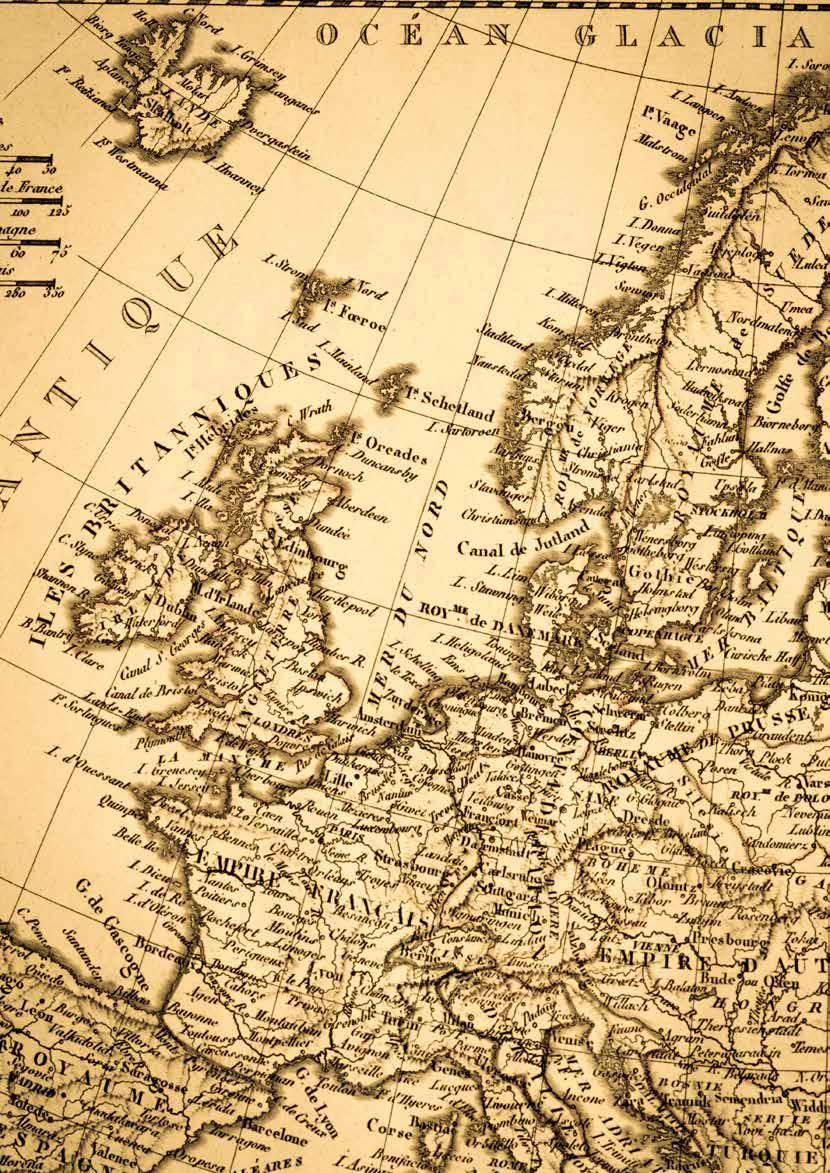
The French poet Paul Valéry famously stated: “I call European any land that has been successively Romanised, Christianised and subjected to the disciplines and spirit of the Greeks.” Need we say more when seeking to define European civilisation? To be fair, we could add that a century later, these same lands were also secularised in the wake of the Enlightenment, the legacy of which, like a snake biting its own tail, is reflected today in destructive individualism.
At the root of European civilisation, which has so little to do with that of European technocrats, are the works of Homer, which should be read by everyone, for their ferocious beauty and the lessons they teach us. While individual destinies are inevitably influenced by deities who intervene in human lives, and even go so far as to plead the cases of their protégés (Aphrodite supporting Paris, who had elevated her to the rank of the fairest of all goddesses, Ares siding with the Trojans, Athena and Hermes helping Ulysses, etc.), the heroes remain free and sovereign throughout the
Paul Valéry francia költő egyszer azt mondta: „Európainak nevezek minden olyan földet, amelyet egymás után romanizáltak, keresztényesítettek és alávetettek a görögök tudományának és szellemének». „Kell-e tovább definiálnunk az európai civilizációt? Hogy igazságosak legyünk, hozzátehetnénk, hogy egy évszázaddal később ugyanezeket a földeket a felvilágosodás nyomán szekularizálták is, amelynek öröksége, mint a saját farkába harapó kígyó, ma a romboló individualizmusban tükröződik.
Az európai civilizáció szívében, amelynek oly kevés köze van az európai technokratákéhoz, Homérosz művének mindenkinek a kezében kellene lennie, kegyetlen szépsége és tanulságai miatt. Miközben az egyéni sorsokat elkerülhetetlenül befolyásolják a megtestesülő istenségek, melyek még az ügyük mellé is állnak (Aphrodité támogatja Páriszt, aki a legszebb istennővé emelte őt, Árész a trójaiak oldalára áll, Athéné és Hermész Odüsszeusz segítségére siet stb.), a hősök a Iliász és Odüsszeia 27000 verse alatt végig szabadok és szuverének maradnak.
27,000 verses of “The Iliad” and “The Odyssey”. Better still, they live in harmony with nature and the elements (no need for a Green Deal) and remain deeply rooted. In “The Iliad” and the conflict between the Achaeans and the Trojans (different times and different customs) people fought for and with their own, and subsequently died with them, while in “The Odyssey”, Ulysses yearns to return to his roots after an absence of nineteen years on the island of Ithaca, despite the promise of being able to enjoy heaven on earth. Symbolically, Ulysses sings “I find nothing sweeter than my homeland and my parents, not even if I inhabited an opulent home, but in a strange country far from them”.
The first to make the transition were the Greeks, whose genius lay in their philosophers, both pre-Socratic and Socratic (“know thyself”), in the democracy that was born under Clisthenes and brought to its peak (albeit imperfectly, seeing as only 10% of the electorate were allowed to vote at the time, but is the people’s voice heard any more clearly today?) by Pericles, by Aristotle’s own critique of politics, by the development of knowledge and the sciences (astronomy, mathematics, physics), and by a certain sense of aesthetics that made beauty the supreme value, particularly in the case of Praxiteles, referred to by Varro in the following words: “any man who has even the slightest bit of culture is familiar with his works because of his excellent talent”.
Sőt, harmóniában élnek a természettel és az elemekkel (nincs szükség Green Dealre), és mélyen gyökereznek. Az Iliászban és az akhájok és a trójaiak konfliktusában, más időkben, más szokásokban a sajátjainkért, a sajátjainkkal harcolnak, és velük együtt halnak meg, míg az Odüsszeiában , ahol Odüsszeusz tizenkilenc év távollét után a földi paradicsom ígérete ellenére, Ithaka szigetén vágyik vissza a gyökereihez. Odüsszeusz szimbólumként énekli, hogy „igaz, hogy semmi sem édesebb, mint a haza és a szülők, még akkor sem, ha az ember tőlük távol, idegen földön, gazdag birtokon él».
Az átmenetet elsőként a görögök biztosították, akiknek zsenialitása a filozófusok, az elő-szókratikusok, a szókratikusok («ismerd meg önmagad»), a Klisthenész alatt született és csúcspontjára jutott demokrácia volt, bár tökéletlenül - akkoriban a választópolgároknak csak 10%-a élvezte a szavazati jogot... de vajon ma jobban meghallgatják a népet? - Periklész, Arisztotelész saját politikakritikája, a tudás és a tudományok (csillagászat, matematika, fizika) fejlődése, valamint egy bizonyos esztétika, amely a szépséget legfőbb értékké tette, különösen Praxitelésznél, akiről Varro így írt: „Kiváló tehetségének köszönhetően nem ismeretlen senki számára, aki egy csöppnyi műveltséggel rendelkezik».
A római szellem az addig túlságosan elvont elveket valósággá és kézzelfoghatóvá tette, a városi szellemtől a teljhatalmú birodalomig, a labirintustól a hidakat és vízvezetékeket is magában foglaló, a kereskedelem fejlődését le-
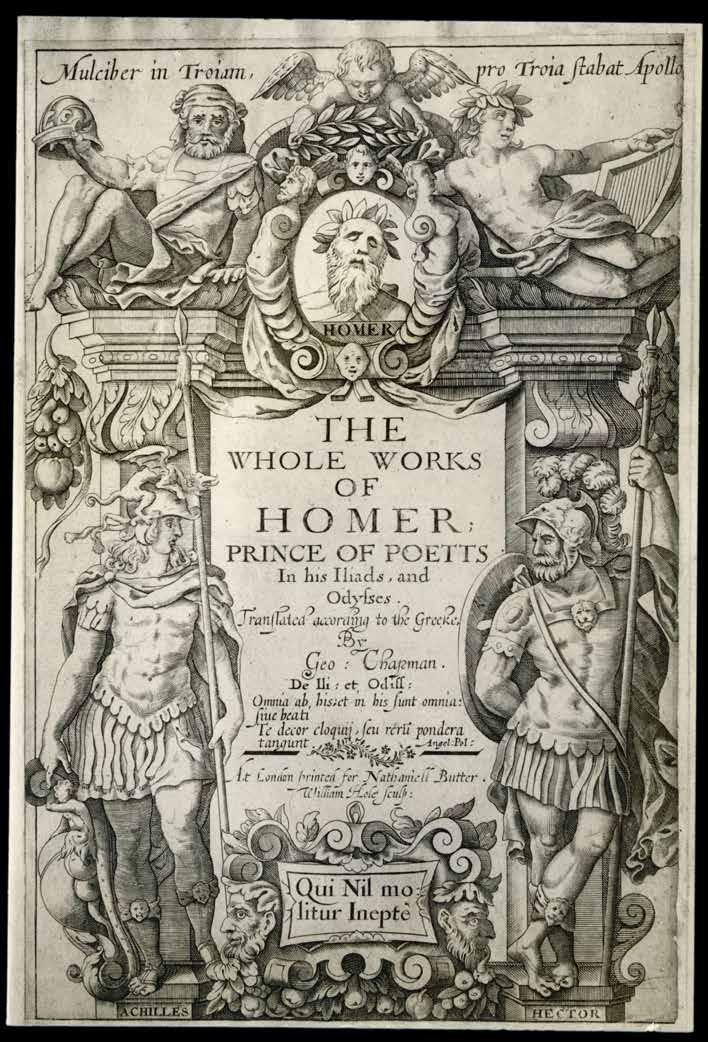
The Roman mindset meant that principles that had hitherto remained too abstract were translated into concrete terms, that the spirit of the city evolved into that of an allpowerful empire, that the labyrinthine web was transformed into an orderly grid network of roads, bridges and aqueducts that allowed trade to flourish. Roman emperors, bloody though they were, were first and foremost men, and no longer god-like heroes; their armies were manned by professionals instead of mercenaries. Codified law replaced arbitrary law, and paved the way for the rule of law (compared to the present day “coup” by judges).
Beginning with Constantine’s conversion in 312, Catholicism shaped the West for fifteen centuries, which is no mean feat, offering a common spirituality and dotting the landscape with a dense tapestry of churches and lofty cathedrals that rose skywards, all of which has taught us what we would now modestly call lessons in life: by driving the merchants out of the temple, an episode magnificently reproduced by El Greco, Jesus taught us to transcend the notion of utilitarianism; in the parables of the lost sheep and the prodigal son, we learn not to reject those who have lost their way; by dying on the cross, Christ bequeathed to us the most valuable lesson of all, that of sacrifice. We are all familiar with Chesterton’s observation that says that “The virtues have gone mad because they have been isolated from each other and are wandering alone.” We cannot, therefore, reduce a religion to isolated acts or lessons, but we must
hetővé tevő rácshálózatig való elmozdulást jelentette. A római császárok, bármennyire is véresek voltak, elsősorban emberek voltak, és már nem istenített hősök; seregeik a zsoldosok helyett hivatásos katonákból álltak. A kodifikált jog felváltotta az önkényt, és megnyitotta az utat a jogállamiság előtt (a jelenlegi bírói „államcsíny» előtt).
Konstantin 312-ben történt megtérése óta a katolicizmus tizenöt évszázadon át strukturálta a Nyugatot, ami nem kis teljesítmény, közös spiritualitást kínálva, az égig érő katedrálisok által áthatott templomok szőnyegével borítva a tájat, és átadva nekünk azt, amit ma szerényen életleckéknek neveznénk: azzal, hogy kiűzte a kereskedőket a templomból - ezt az epizódot El Greco nagyszerűen ábrázolta -, Jézus arra tanított minket, hogy nézzünk túl a haszonelvűségen; az elveszett bárányról és a tékozló fiúról szóló példabeszédekben megtanuljuk, hogy ne dobjuk el magunktól azokat, akik eltévedtek; Krisztus a kereszthalállal a legszebb leckét hagyta ránk, az áldozathozatal leckéjét. Mindannyian tudjuk, mit mondott Chesterton arról, hogy megőrülnek, mert elszigetelődnek egymástól, és egyedül bolyonganak. Ezért nem redukálhatunk egy vallást elszigetelt cselekedetekre vagy tanításokra, hanem úgy kell látnunk, mint a legszebb freskókat, különben a mélyen emberi elvek tévútra kerülnek és ellenünk fordulnak. Így van ez a jótékonysággal is, amely kötelező szolidaritássá vált, a világ összes nyomorúságának befogadásává, saját magunkat áldozzuk fel, amikor túlságosan odafordítjuk a másik orcánkat.
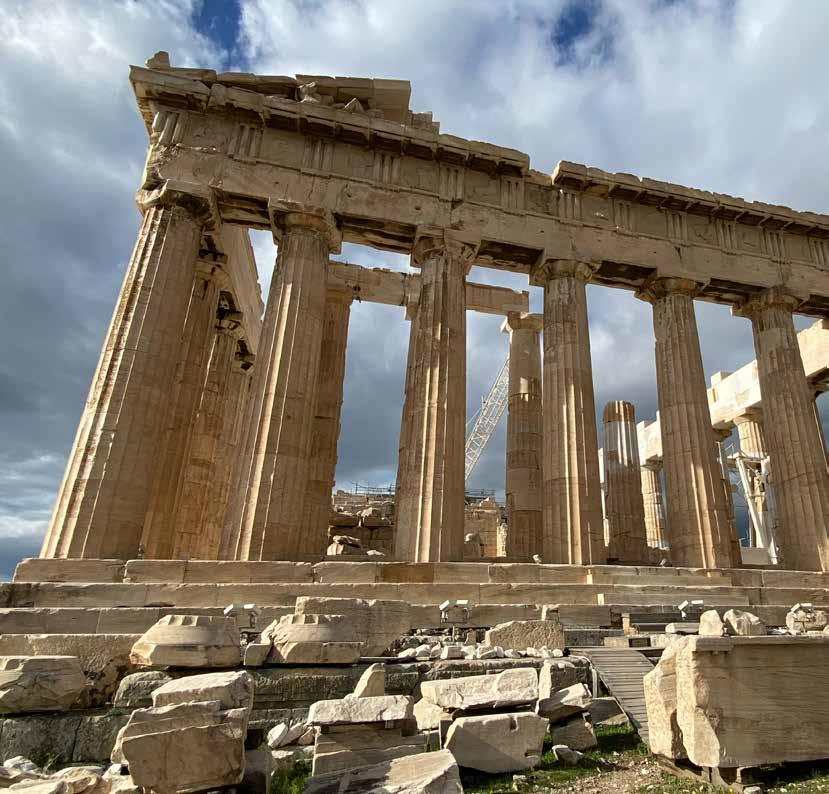
conceive of it as the loveliest of historical epics, without which profoundly human principles would go astray and turn against us. And so it is with charity, which has become a compulsory form of solidarity, the welcoming of every worldly misery, our own self-effacement being the result of our constant willingness to turn the other cheek.
IDENTITÁS ÉS DEMOKRÁCIA
PÁRT
Az Identitás és Demokrácia Párt által kiadott magazin
Identitás és Demokrácia Párt
75 Boulevard Haussmann - 75008 Paris - France contact@id-party.eu
Az Identitás és Demokrácia Párt elnöke: Gerolf Annemans A kiadvány igazgatója: Gregory Vanden Bruel
Az Identitás és Demokrácia Pártot részben az Európai Parlament finanszírozza, és kizárólagosan felelős ezért a kiadványért.
Ez a kiadvány nem eladásra készült.
www.id-party.eu
facebook.com/IDParty/ twitter.com/IDParty_
instagram.com/idparty_/
IDENTITÁS ÉS DEMOKRÁCIA
PÁRT
Az Eidos az Identitás és Demokrácia Párt magazinja.
Az ID pártot részben az Európai Parlament finanszírozza, és kizárólagos felelősség bír a kiadvány tartalmáért.